Maine Documents
Quitclaim Deed
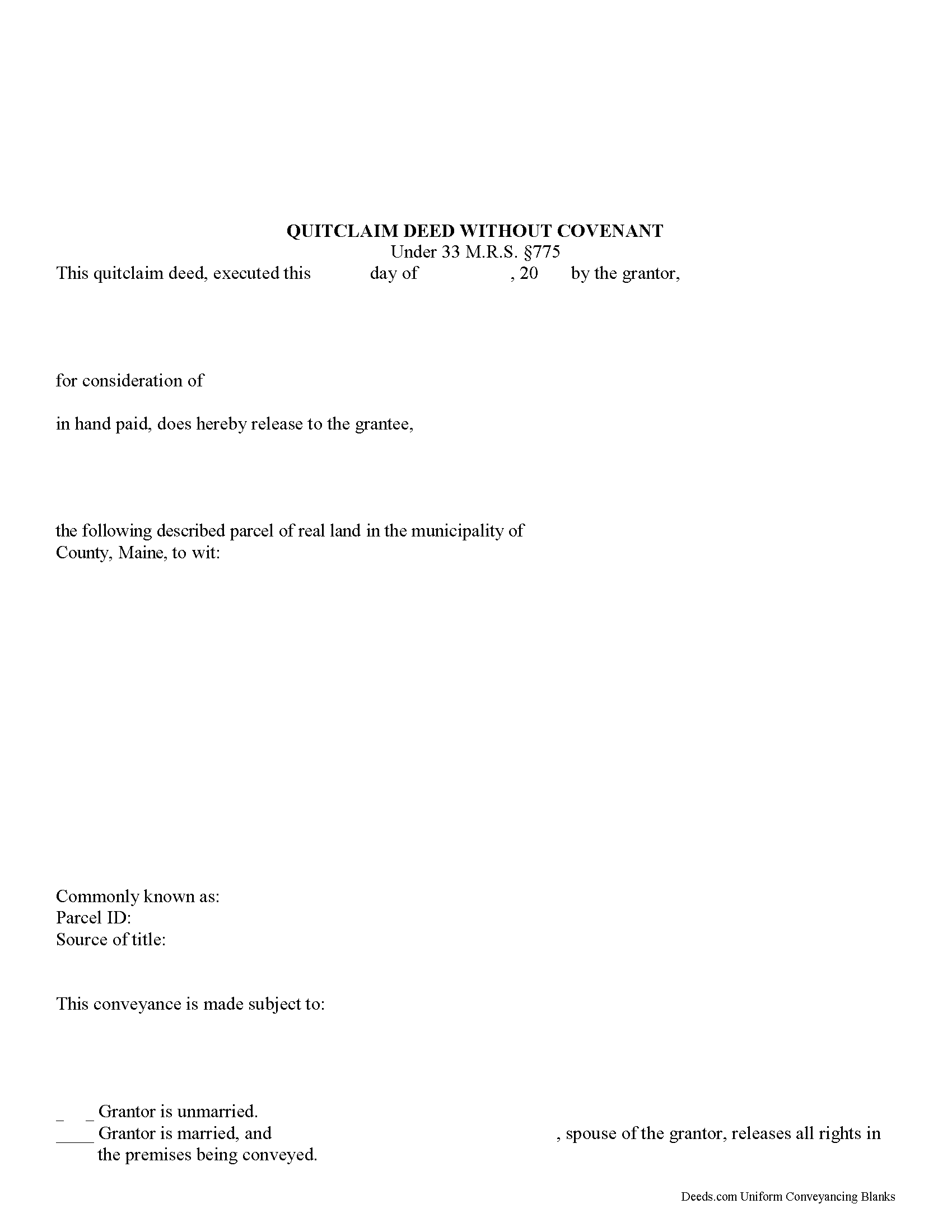
Quitclaim deed documents in the state of Maine are governed by 33 M.R.S. 161, which states that "a deed of quitclaim of the usual form conveys the estate which the grantor has and can convey by a deed of any other form."
33 M.R.S. 162 provides that any deed conveying rights to land must be in writing and signed by the grantor or an authorized representative. 33 M.R.S. 201-A adds the additional obligations of a reference to the prior book, page, and/or document number of the deed wherein the grantor gained interest in the property; a complete legal description in metes and bounds or a specific reference to a previously recorded survey plan of the land; and a clear statement of any exceptions, reservations or negations of warranty. 33 M.R.S. 306, 456, and 775 combine to present the statutory form for a quitclaim deed without covenant, and to expand the instructions to include the name, address, municipality, county, state, and marital status of all grantors and grantees; the correct title for the document (Quitclaim Deed without Covenant); the appropriate language of conveyance; a release of rights recitation from the grantor's spouse, (if any); the execution date (when the q... More Information about the Maine Quitclaim Deed
Quitclaim Deed with Covenants
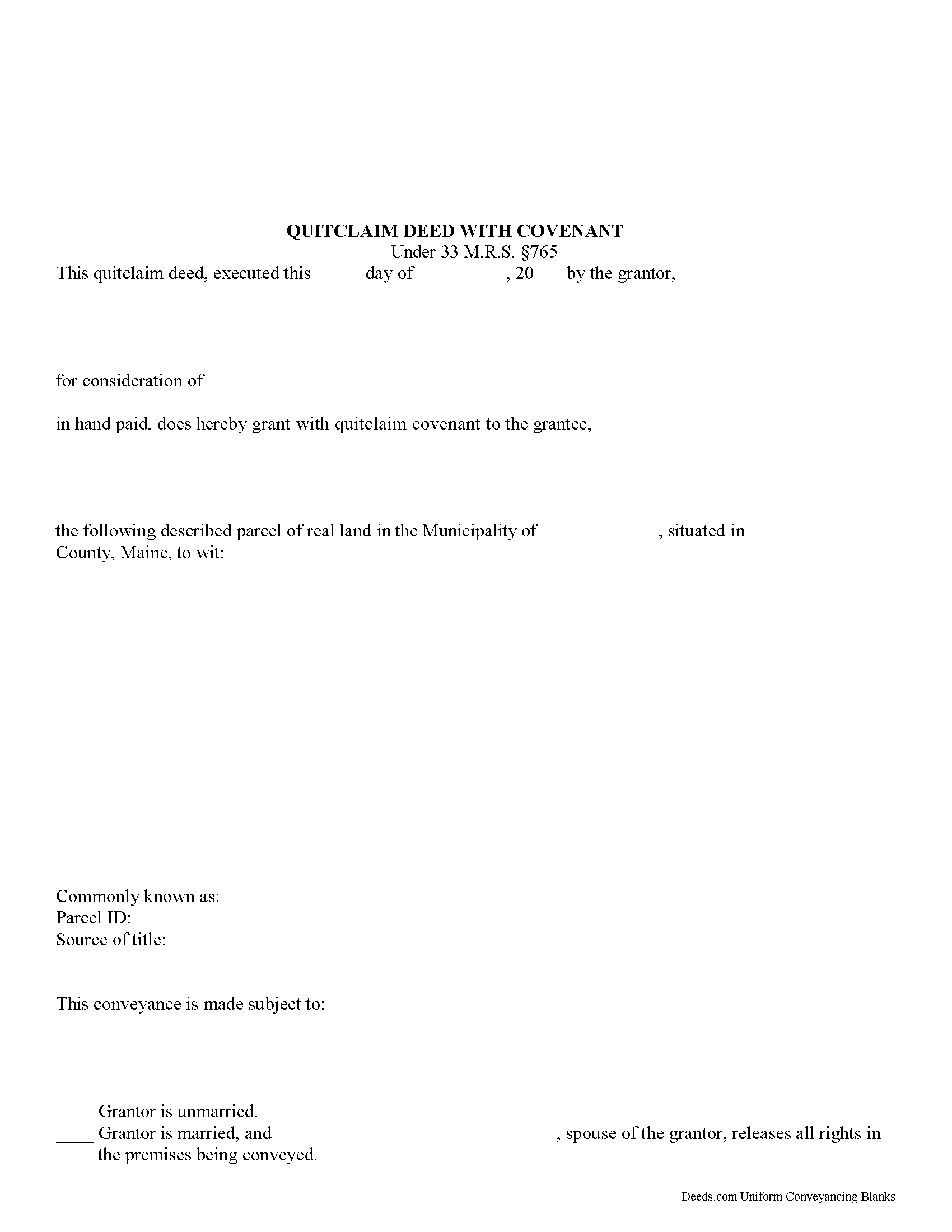
In Maine, the quitclaim deed with covenants includes those covenants generally associated with special warranty deeds. 33 M.R.S. 763-766 define the warranties and covenants associated with non-mortgage conveyances. By incorporating the words "with quitclaim covenants" in the text of the document:
The grantor covenants with the grantee, his heirs and assigns that he will warrant and forever defend the premises to the said grantee, his heirs and assigns forever, against the lawful claims and demands of all persons claiming by, through or under him.
This deed form is valid as-is for use as a special warranty deed in Maine.
Special warranty deeds frequently include other restrictions or covenants, which may be disclosed in the space provided on the form.
(Maine QCD Package includes form, guidelines, and completed example)... More Information about the Maine Quitclaim Deed with Covenants
Gift Deed
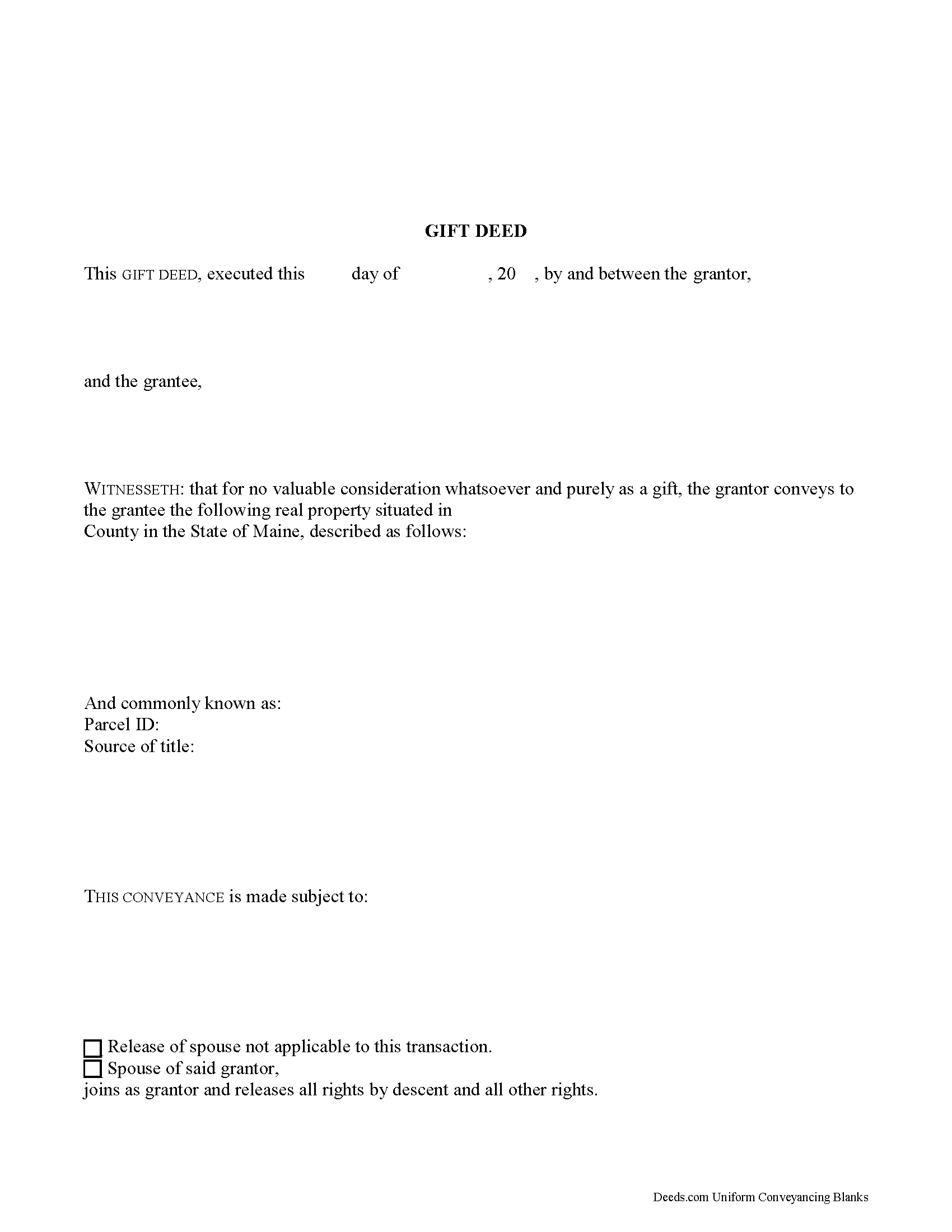
Gifts of Real Property in Maine
Gift deeds convey title to real property from one party to another with no exchange of consideration, monetary or otherwise. Often used to transfer property between family members or to gift property as a charitable act or donation, these conveyances occur during the grantor's lifetime. Gift deeds must contain language that explicitly states that no consideration is expected or required. Ambiguous language, or references to any type of consideration, can make the gift deed contestable in court.
A lawful gift deed includes the grantor's full name, marital status, and mailing address, as well as the grantee's full name, marital status, vesting information, and mailing address. Vesting describes how the grantee holds title to the property. Generally, real property is owned in either sole ownership or co-ownership. For Maine residential property, the primary methods for holding title are tenancy in common and joint tenancy. An estate conveyed to two or more persons is considered a tenancy in common, unless a joint tenancy is clearly expressed (33 M.R.S. 159).
As with any conveyance of realty, a gift deed requires a complete legal description of... More Information about the Maine Gift Deed
Warranty Deed
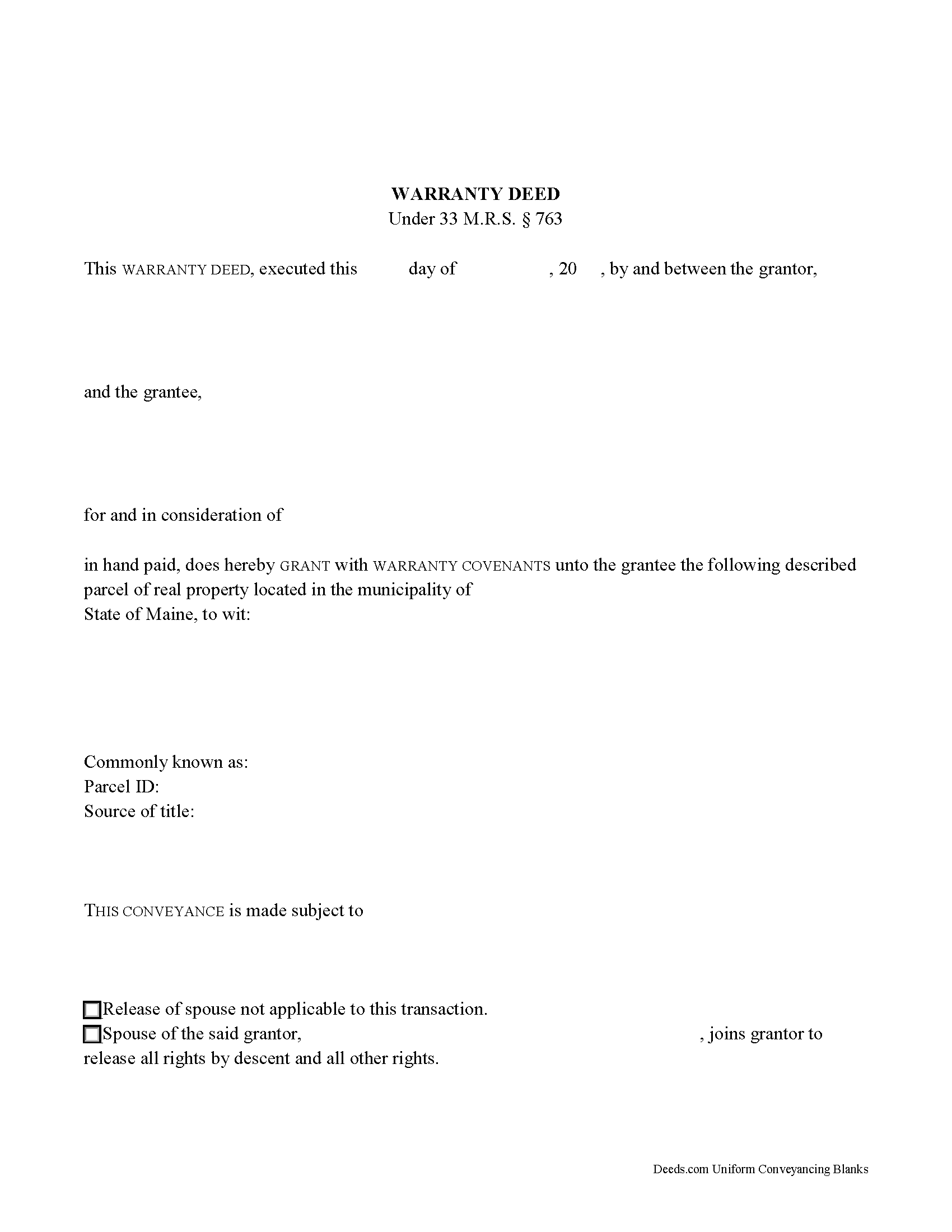
Real property transfers are governed by Title 33 of the Maine Revised Statutes.
A warranty deed under 33 M.R.S. 763 transfers real property from the seller (grantor) to the buyer (grantee). Using the statutory phrase "with warranty covenants" in the deed implies that the grantor warrants that they are the true owner of the property and have the legal right to convey it, and that the property is free of liens or encumbrances unless otherwise listed in the deed.
A lawful warranty deed identifies the names and addresses of each grantor and grantee, For Maine residential property, the primary methods for holding title are tenancy in common and joint tenancy. An estate conveyed to two or more persons is considered a tenancy in common, unless a joint tenancy is clearly expressed (33 M.R.S. 159).
Include the source of title, and a complete legal description of the property; without these two things, the document does not constitute notice to third parties (33 M.R.S. 201-A(2)). The deed must be signed by each grantor, if there are more than one. Additional witnesses are not required to sign the deed, but it must be notarized and acknowledged by the grantor in the presence of an o... More Information about the Maine Warranty Deed
Grant Deed
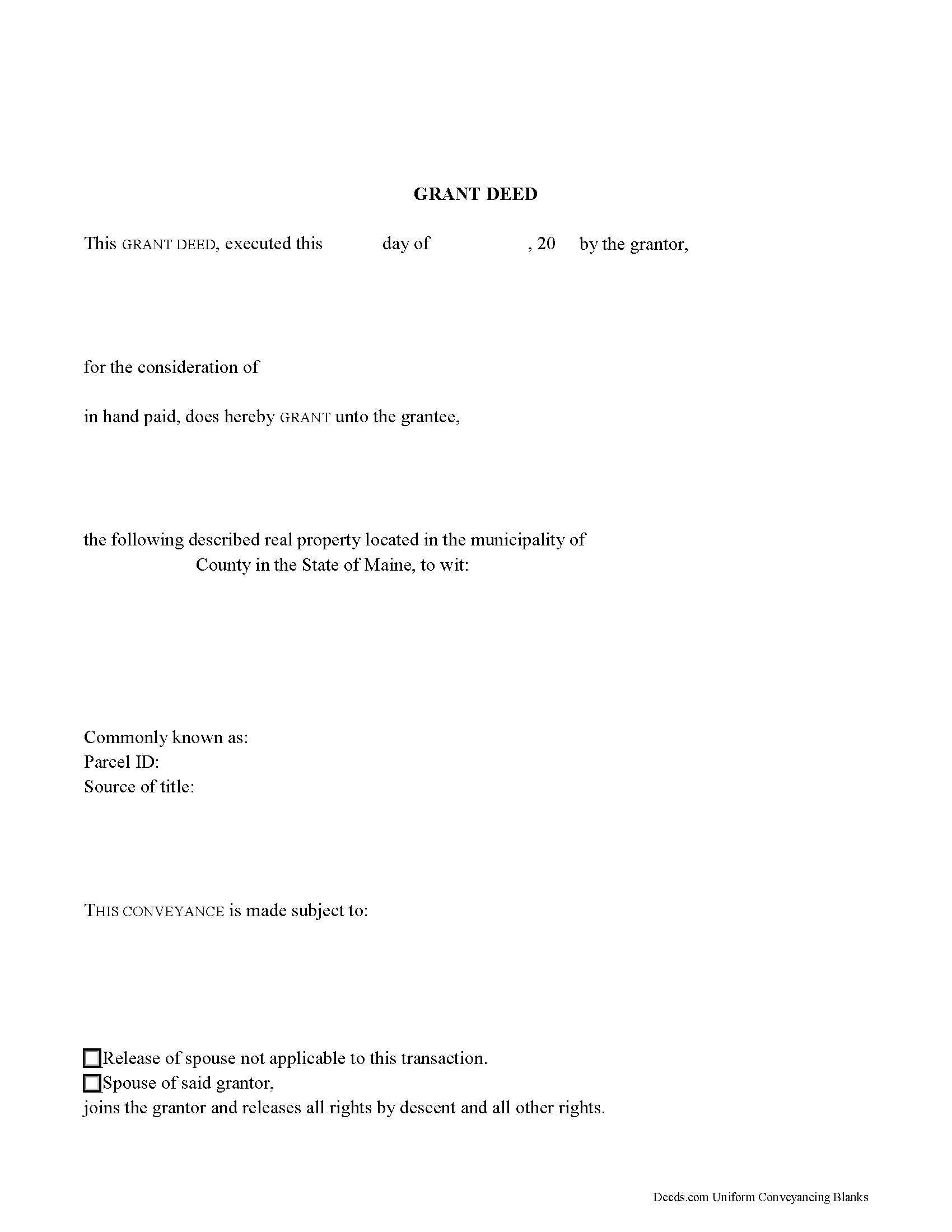
Real property transfers are governed by Title 33 of the Maine Revised Statutes, but the statutes do not specifically address grant deeds.
A grant deed is a legal document used to transfer, or convey, rights in real property from a grantor (seller) to a grantee (buyer). It contains covenants, or guarantees, that the grantor has not previously sold the real property interest now being conveyed to the grantee, and that the property is being conveyed to the grantee without any liens or encumbrances, except for those specifically disclosed in the deed. Grant deeds do not generally require the grantor to defend title claims.
A lawful grant deed identifies the names and addresses of each grantor and grantee. In addition, it states how the grantee will vest (hold) title. For Maine residential property, the primary methods for holding title are tenancy in common and joint tenancy. An estate conveyed to two or more persons is considered a tenancy in common unless a joint tenancy is clearly expressed (33 M.R.S. 159).
Include the source of title and a complete legal description of the property; without these two things, the document does not constitute notice to third parties (33 M.R.... More Information about the Maine Grant Deed
Correction Deed
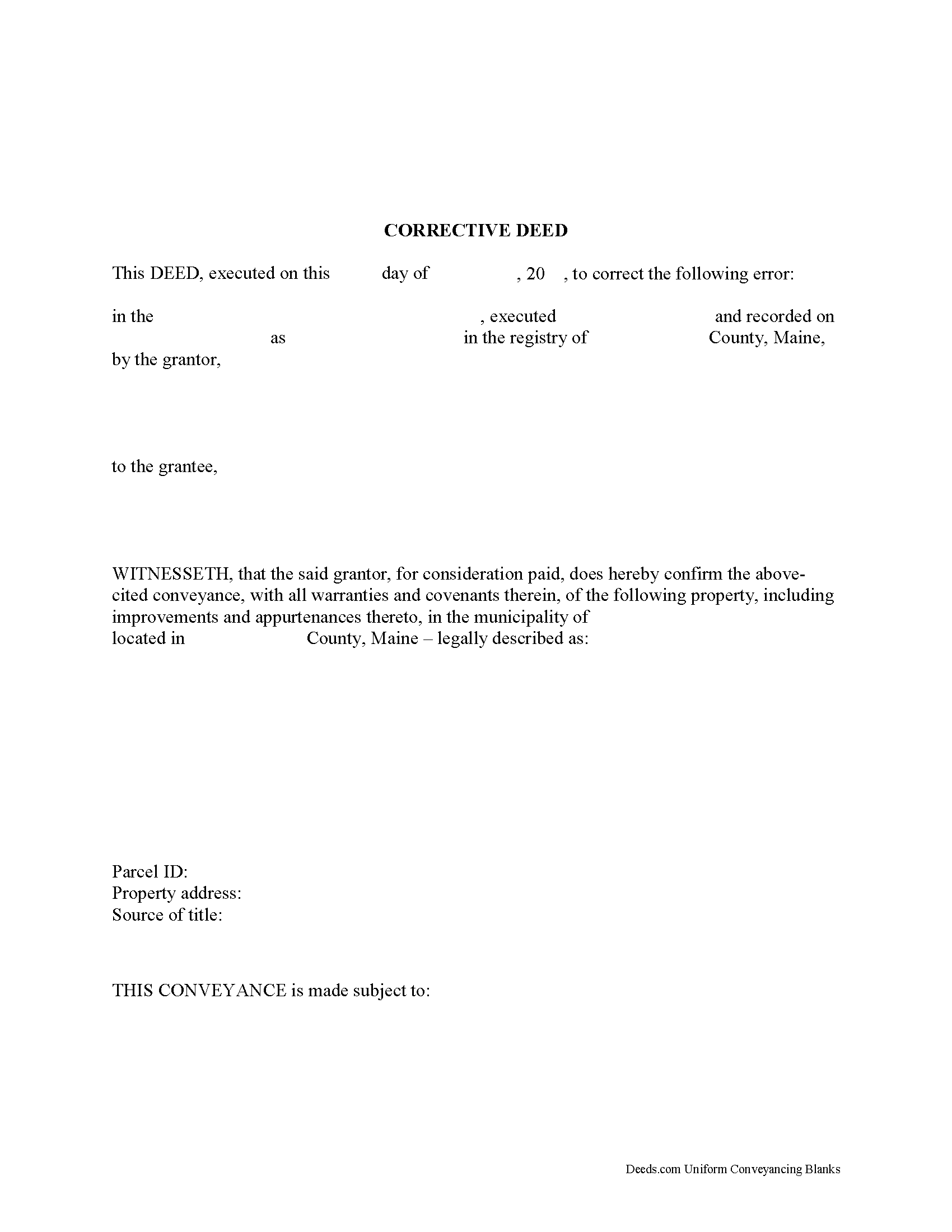
Use the corrective deed to correct an error in a previously recorded deed of conveyance in Maine.
Correcting an error in a recorded deed helps prevent problems that might arise when the current owner attempts to sell the property. The best method for correction is prepare and record a new document, a so-called corrective deed. This document does not convey title; instead, it confirms the prior conveyance of the property.
Apart from supplying the correct information, the new deed must state the reason for correcting and reference the prior deed by title, date, and recording number. It must be signed by the original grantor, confirming the earlier conveyance to the original grantee. When correcting the legal description, both the grantor and the grantee should sign the corrective deed to avoid any doubt regarding the conveyed property.
For certain types of changes, however, a correction deed may not be appropriate. Adding or removing a grantee, for example, or changing the manner in which title is held, or making material changes to the legal description, especially deleting a portion of the originally transferred property, may all require a new deed of conveyance instead ... More Information about the Maine Correction Deed
Easement Deed
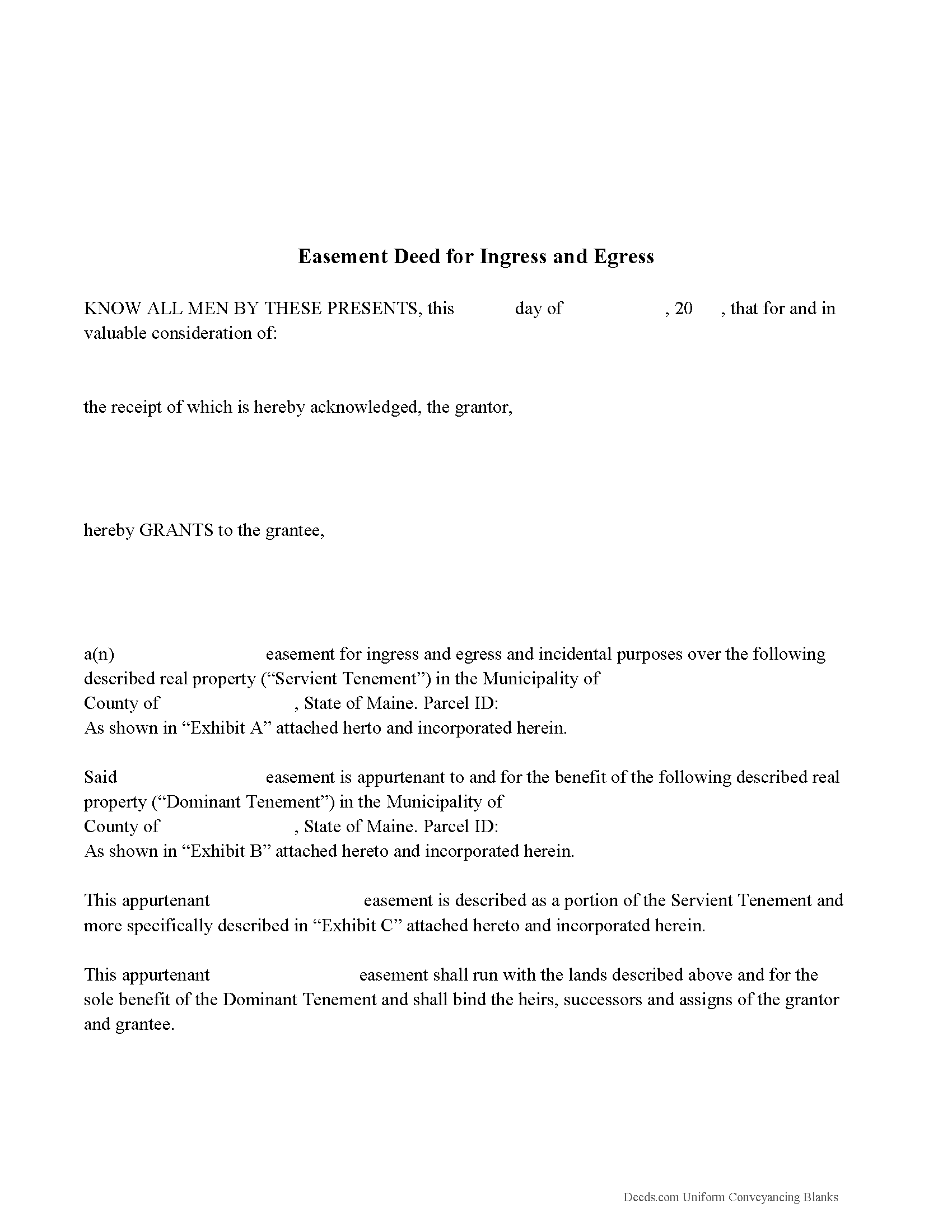
An easement or right-of-way is defined in the Maine Revised Statutes as the right of a person to pass over the land of another person ( 33-458). The easement deed is the instrument which creates this right. In a conveyance of real estate in Maine, all rights, easements, privileges, and appurtenances belonging to the granted estate should be included in the conveyance, unless a contrary intention is stated in the deed (33-773).
A conservation easement, another type of easement in Maine, is a non-possessory interest of a holder in real property imposing limitations or affirmative obligations for the purpose of retaining or protecting the natural, scenic, or open space values of real property (33-476). This type of easement can be created, conveyed, recorded, assigned, or partially released in the same manner as other easements created by written instrument in the state ( 33-477). A solar easement can also be created in this state for the purpose of ensuring direct access to sunlight. This type of easement is required to be in writing and is recorded and indexed the same way that other conveyances of real property interests are recorded. Solar easements are appurtenant and run wit... More Information about the Maine Easement Deed
Termination of Easement
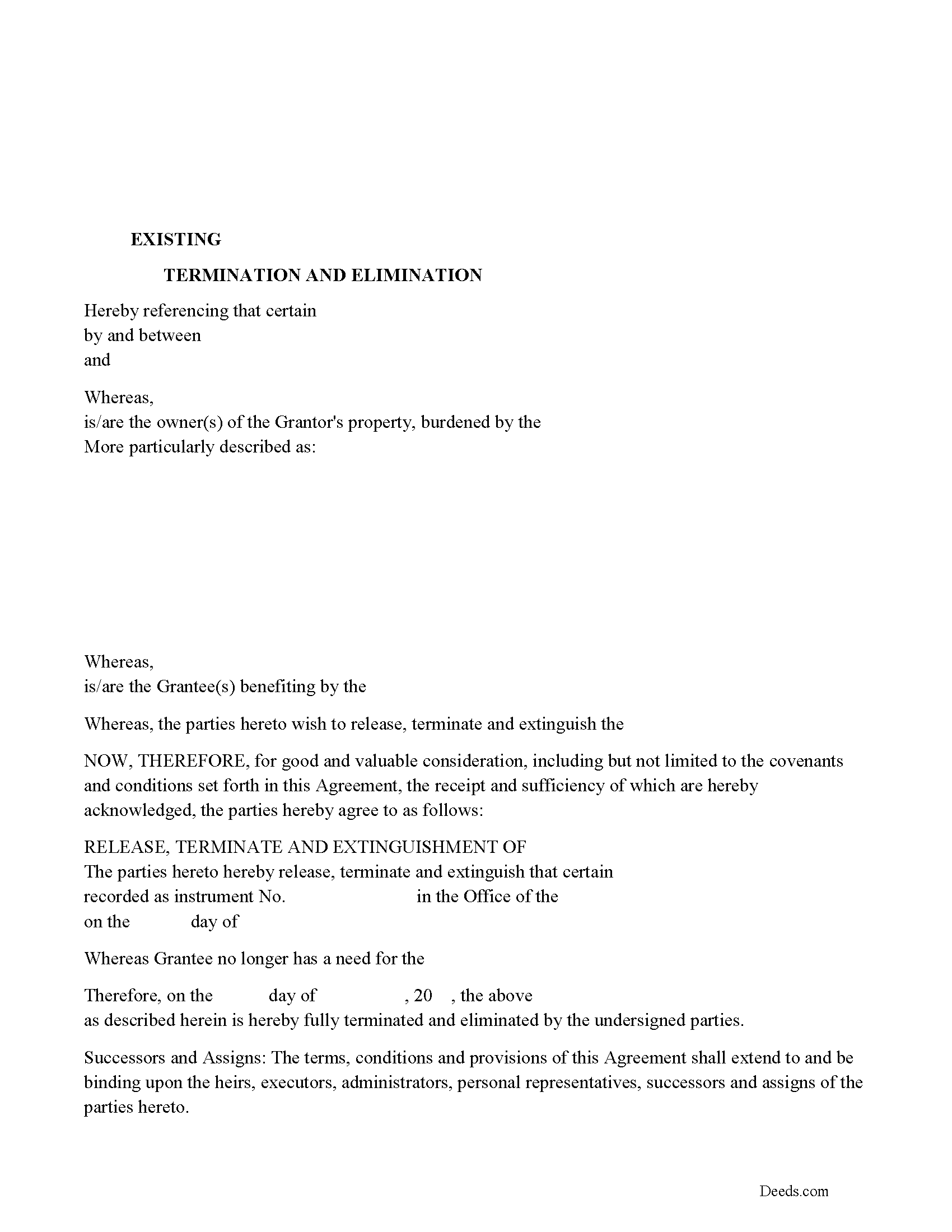
Use this form to release, terminate, extinguish a previously recorded document that involves access to and from a property.
Documents such as:
1. Easement Deeds or Agreements (An easement is a non-possessory interest in land, granting the right to use someone else's property for a specific purpose, like a driveway or utility line)
2. Access Roads
3. Right of Ways
4. Utility Easements (Power, Gas, Water, Sewer, Etc.)
5. Drainage Easements
This document allows the owner of the land, burdened by the access and the party that benefits from the access, to sign an agreement releasing the property from such access, ... More Information about the Maine Termination of Easement
Trustee Deed
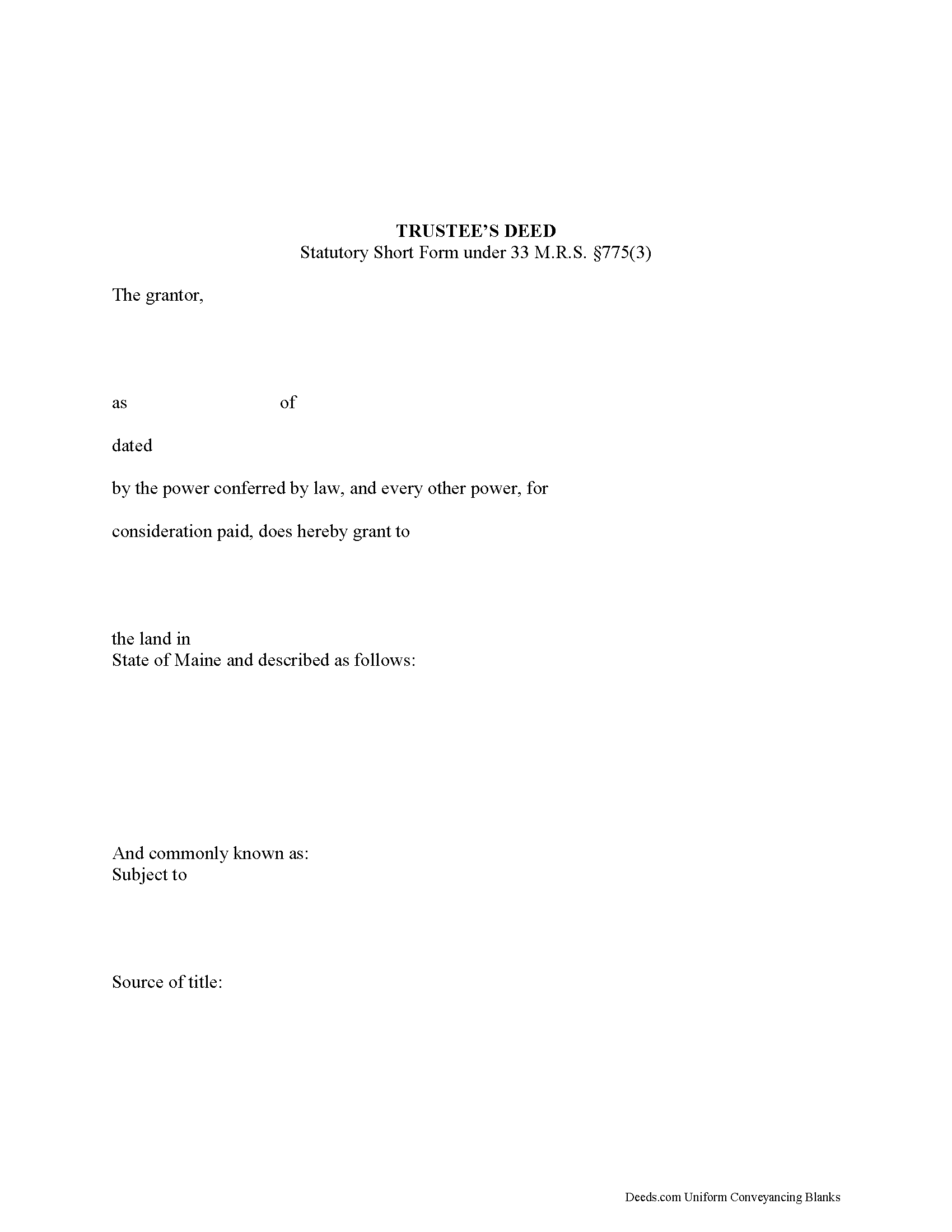
The trustee's deed in Maine is a statutory short form codified at 33 M.R.S. 775(3).
Under the Maine Uniform Trust Code, a trust is created by a "[t]ransfer to another person as trustee during the settlor's lifetime or by will ... taking effect upon the settlor's death" (18-B M.R.S. 401(1)). A settlor is defined as "a person, including a testator, who creates or contributes property to a trust" (18-B M.R.S. 103(14)).
According to Black's Law Dictionary, 8th ed., a trust is "a property interest held by one person (the trustee) at the request of another (the settlor) for the benefit of a third party (the beneficiary)." A beneficiary) is a person who holds "a present or future beneficial interest in a trust, vested or contingent" (18-B M.R.S. 103(2)).
A trust created during the settlor's lifetime is a living trust, and a trust taking effect upon the settlor's death is a testamentary trust. Conveying trust property after a settlor has died requires a different type of deed called a deed of distribution by personal representative. To transfer real estate held in a living trust, however, a trustee's deed is used.
The trustee's deed is named for the person executing the deed. ... More Information about the Maine Trustee Deed
Personal Representative Deed of Distribution Testate
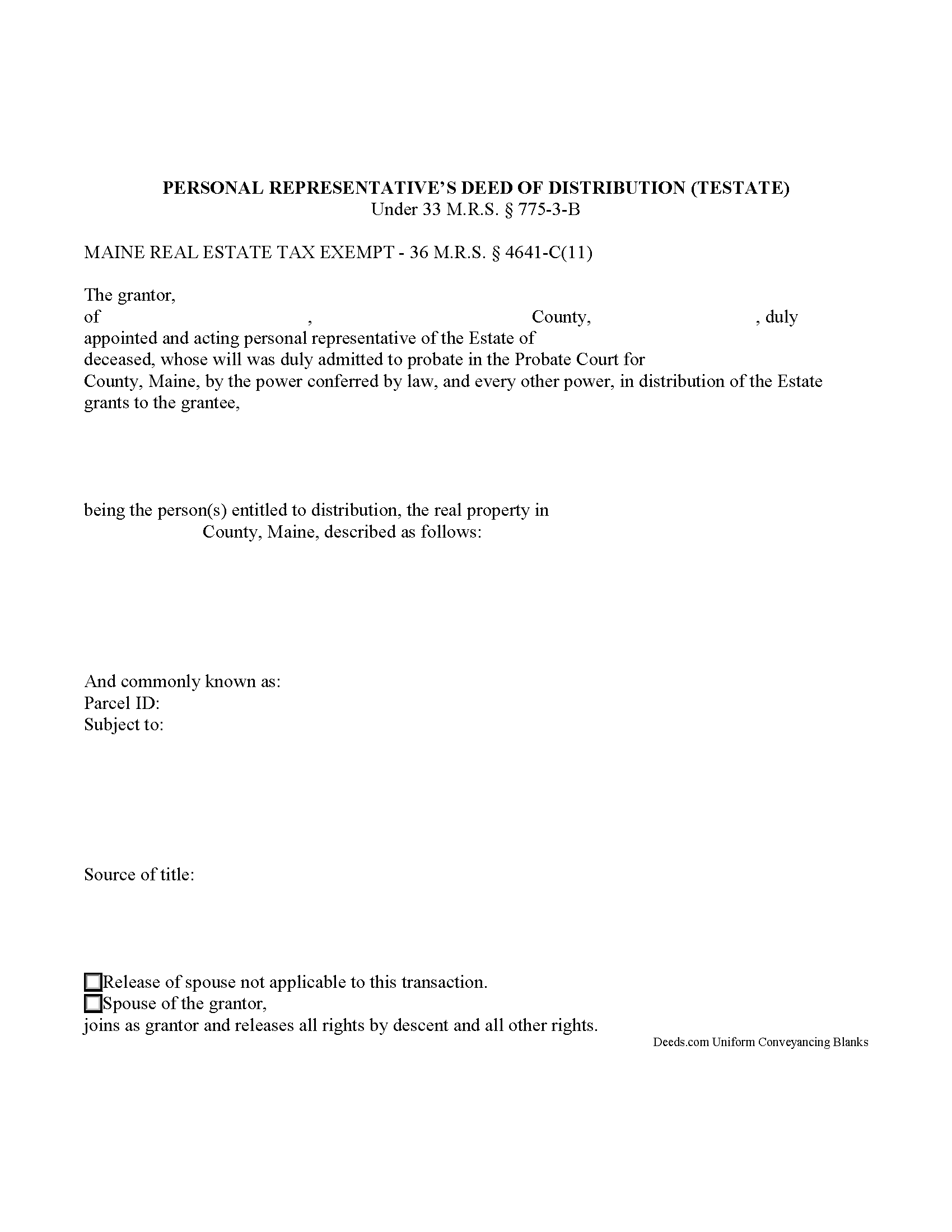
A personal representative of a testate estate is someone named in the decedent's will to administer the estate.
The personal representative's (PR) deed of distribution for a testate estate, under 33 M.R.S. 775-3-B, is a fiduciary instrument used to convey real property from an estate to a successor in interest entitled to the distribution, as set forth in the decedent's will. The PR deed conveys interest without any implied covenants of title (33 M.R.S. 771).
In addition to meeting the standard content requirements for real estate conveyancing documents, PR deeds must reference information regarding the relevant probate case. Deeds of distribution are exempt from real estate transfer taxes in Maine.
Consult a lawyer with questions about Maine personal representative's deeds or with other inquiries related to the probate process.
(Maine Personal Representative Deed Package includes form, guidelines, and completed example)... More Information about the Maine Personal Representative Deed of Distribution Testate
Personal Representative Deed of Distribution Intestate
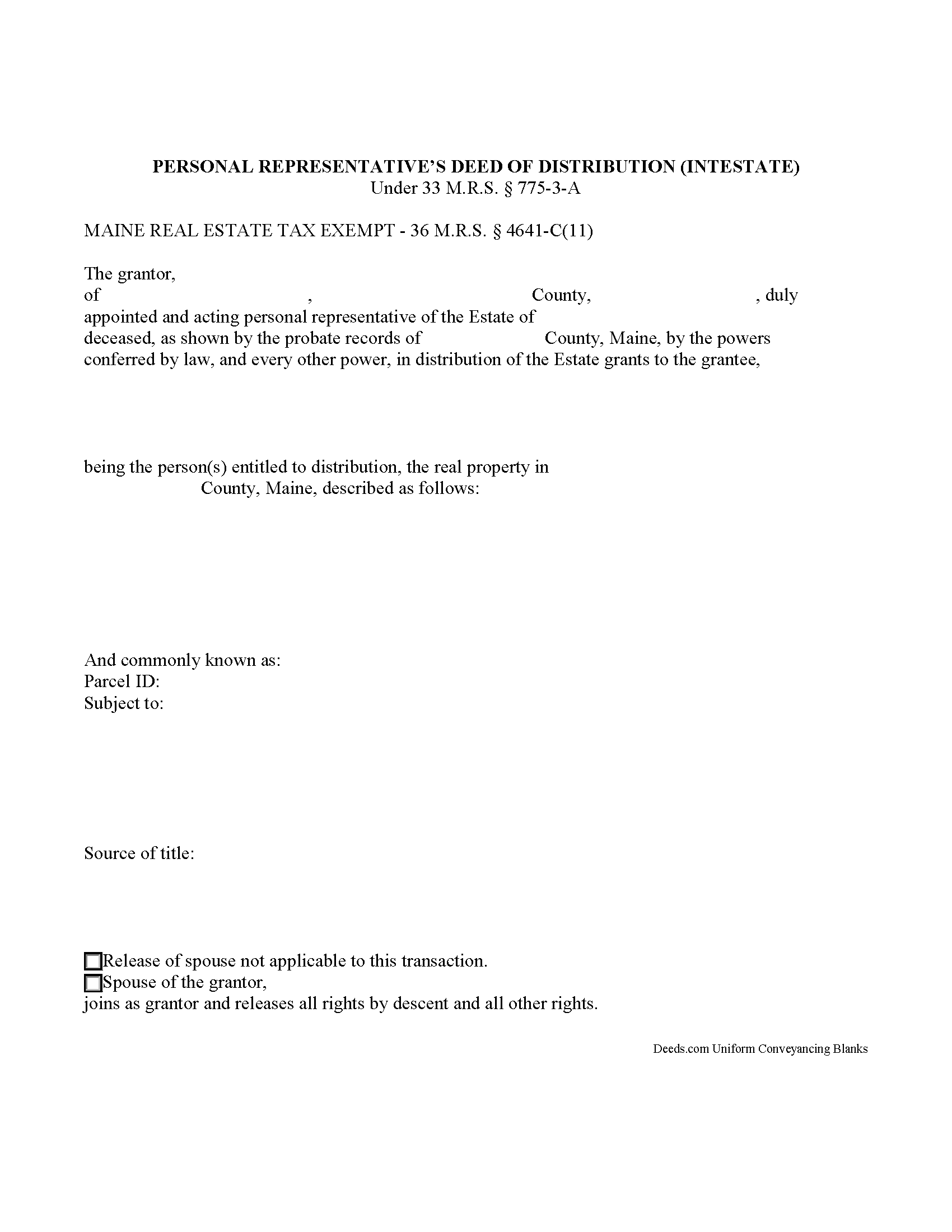
A personal representative of an intestate estate is someone selected by the probate court to administer the decedent's estate when the decedent dies without a will.
The personal representative's (PR) deed of distribution for an intestate estate, under 33 M.R.S. 775-3-A, is a fiduciary instrument used to convey real property from an estate to a successor in interest pursuant to Maine's laws of descent. The PR deed conveys interest without any implied covenants of title (33 M.R.S. 771).
In addition to meeting the standard content requirements for real estate conveyancing documents, PR deeds must reference information regarding the relevant probate case. Deeds are subject to transfer taxes in Maine, and require a real estate transfer tax form, unless a valid exemption is noted on the deed. File the deed at the appropriate county's Register of Deeds.
Consult a lawyer with questions about Maine personal representative's deeds or with other inquiries related the probate process.
(Maine PRD Package includes form, guidelines, and completed example)... More Information about the Maine Personal Representative Deed of Distribution Intestate
Personal Representative Deed of Sale Testate
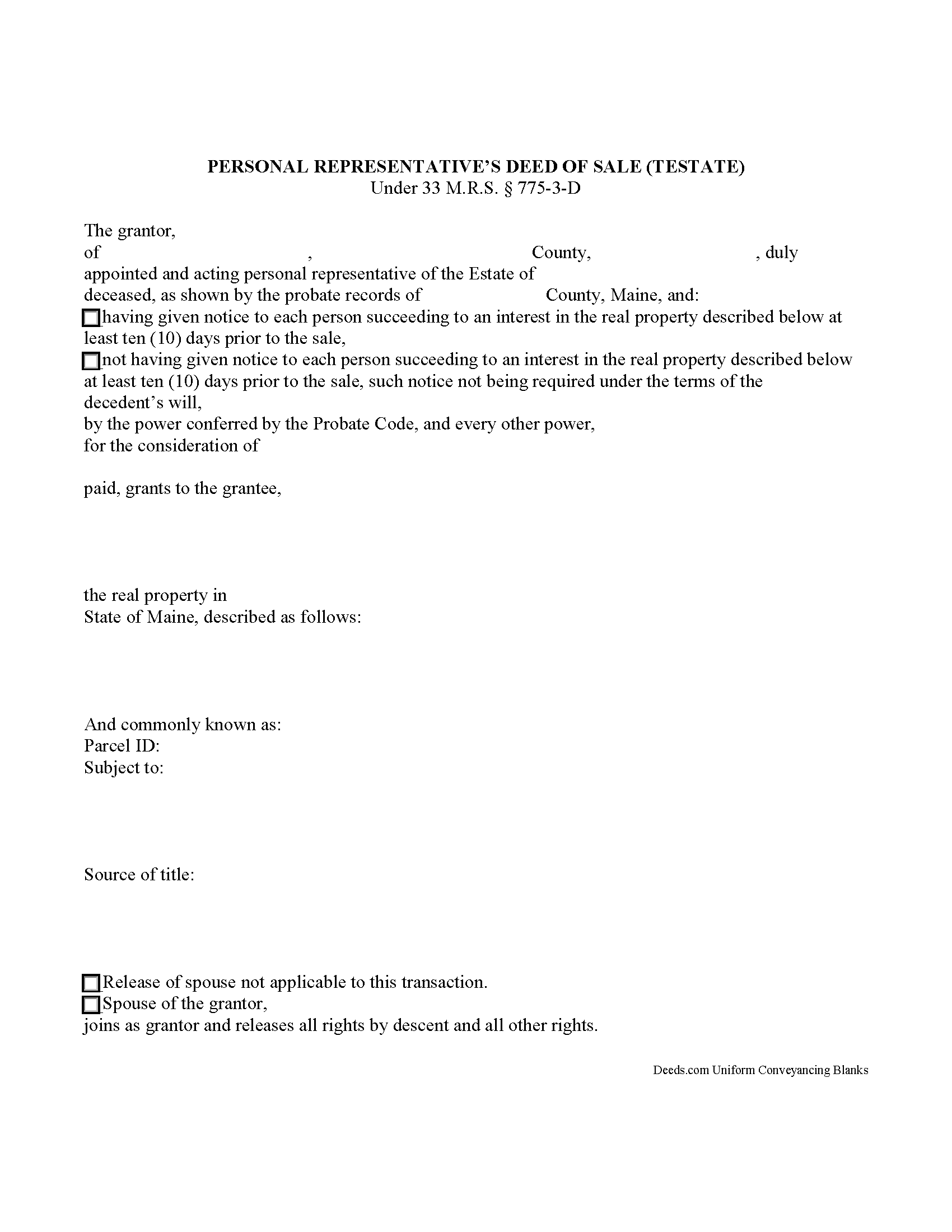
Maine Personal Representative's Deed of Sale for a Testate Estate
The personal representative's (PR) deed of sale for a testate estate, under 33 M.R.S. 775-3-D, is a fiduciary instrument used to convey real property from an estate to a grantee (purchaser) when the decedent has died with a will. The PR deed conveys interest without any implied covenants of title (33 M.R.S. 771).
A personal representative of a testate estate is someone named in the decedent's will to administer the estate.
The personal representative must have a court order to sell real property, unless the terms of the decedent's will direct the sale. The PR may be required to give notice of the sale, unless the will waives this requirement.
In addition to meeting the standard content requirements for real estate conveyancing documents, PR deeds must reference information regarding the relevant probate case. Deeds are subject to transfer taxes in Maine, and require a real estate transfer tax form, unless a valid exemption is noted on the deed. File the deed at the appropriate county's Register of Deeds.
Consult a lawyer with questions about Maine personal representative's deeds or with other inquiri... More Information about the Maine Personal Representative Deed of Sale Testate
Personal Representative Deed of Sale Intestate
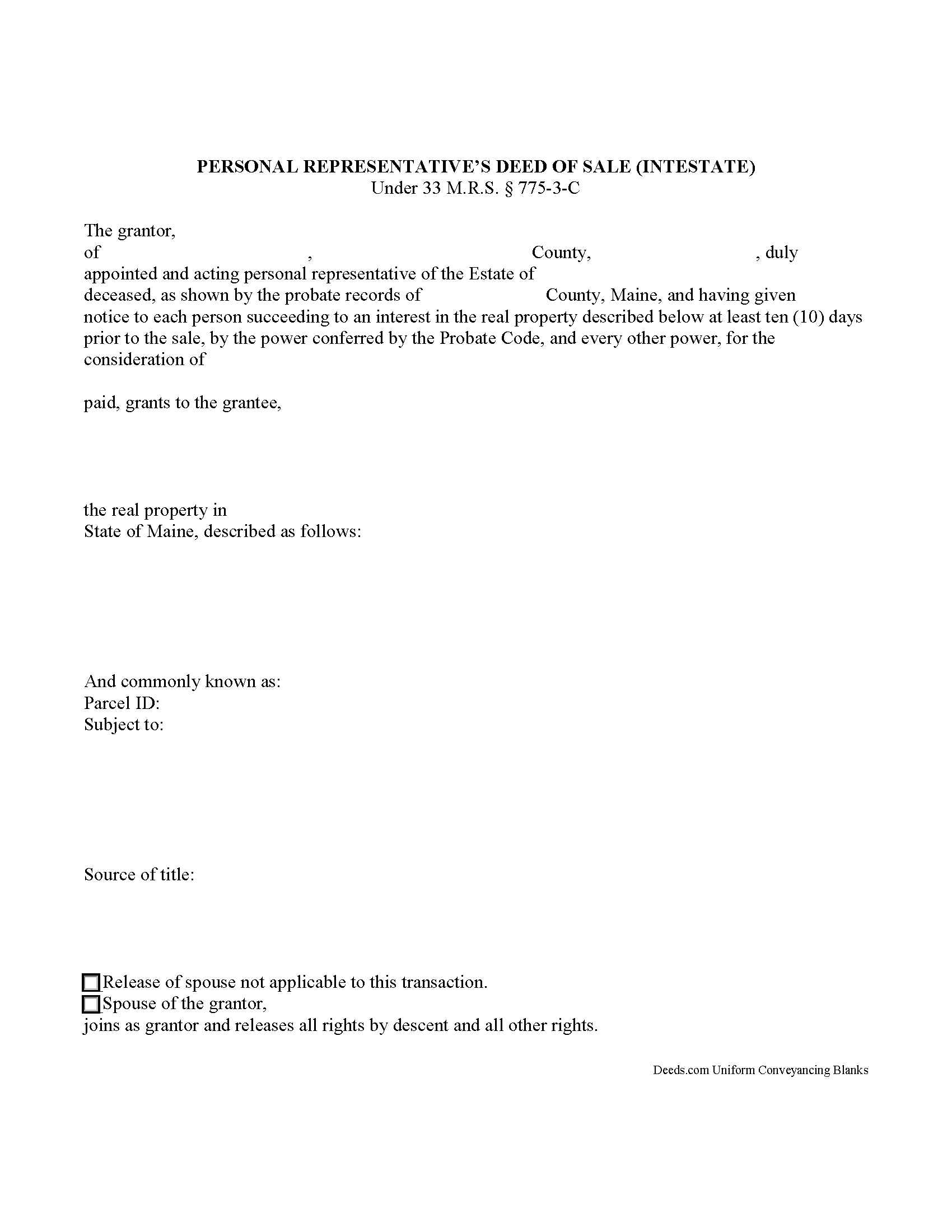
The personal representative's (PR) deed of sale for an intestate estate, under 33 M.R.S. 775-3-C, is a fiduciary instrument used to convey real property from an estate to a grantee (purchaser) pursuant to an order for sale. The PR deed conveys interest without any implied covenants of title (33 M.R.S. 771).
A personal representative of an intestate estate is someone selected by the probate court to administer the decedent's estate when the decedent dies without a will.
The PR must give notice of the sale ten at least (10) days ahead of the sale. In addition to meeting the standard content requirements for real estate conveyancing documents, PR deeds must reference information regarding the relevant probate case. Deeds are subject to transfer taxes in Maine, and require a real estate transfer tax form, unless a valid exemption is noted on the deed. File the deed at the appropriate county's Register of Deeds.
Consult a lawyer with questions about Maine personal representative's deeds or with other inquiries related the probate process.... More Information about the Maine Personal Representative Deed of Sale Intestate
Mortgage Instrument and Promissory Note
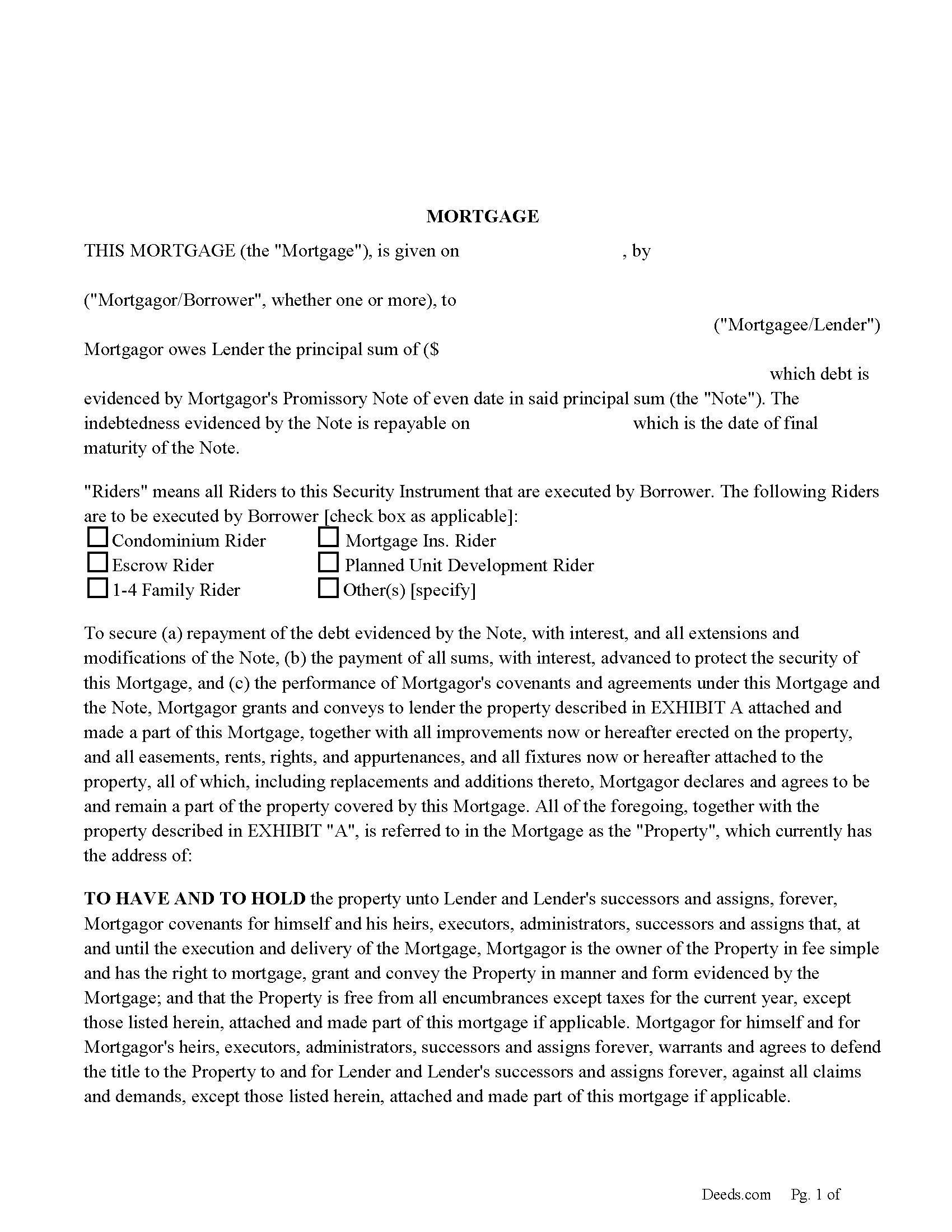
Mortgage document and Promissory Note used to finance residential, vacant land, rental property, condominiums, and planned unit developments. This form allows the mortgagee/lender to foreclose traditionally or using the STATUTORY POWER OF SALE (33 M.R.S.A. 501-A) if the property meets certain conditions. This mortgage and promissory note are governed by the laws of the State of Maine and contain strict default terms, this can be advantageous to the lender in case of default.
(Maine Mortgage Package includes forms, guidelines, and completed examples)
For use in Maine only.
... More Information about the Maine Mortgage Instrument and Promissory Note
Discharge of Mortgage
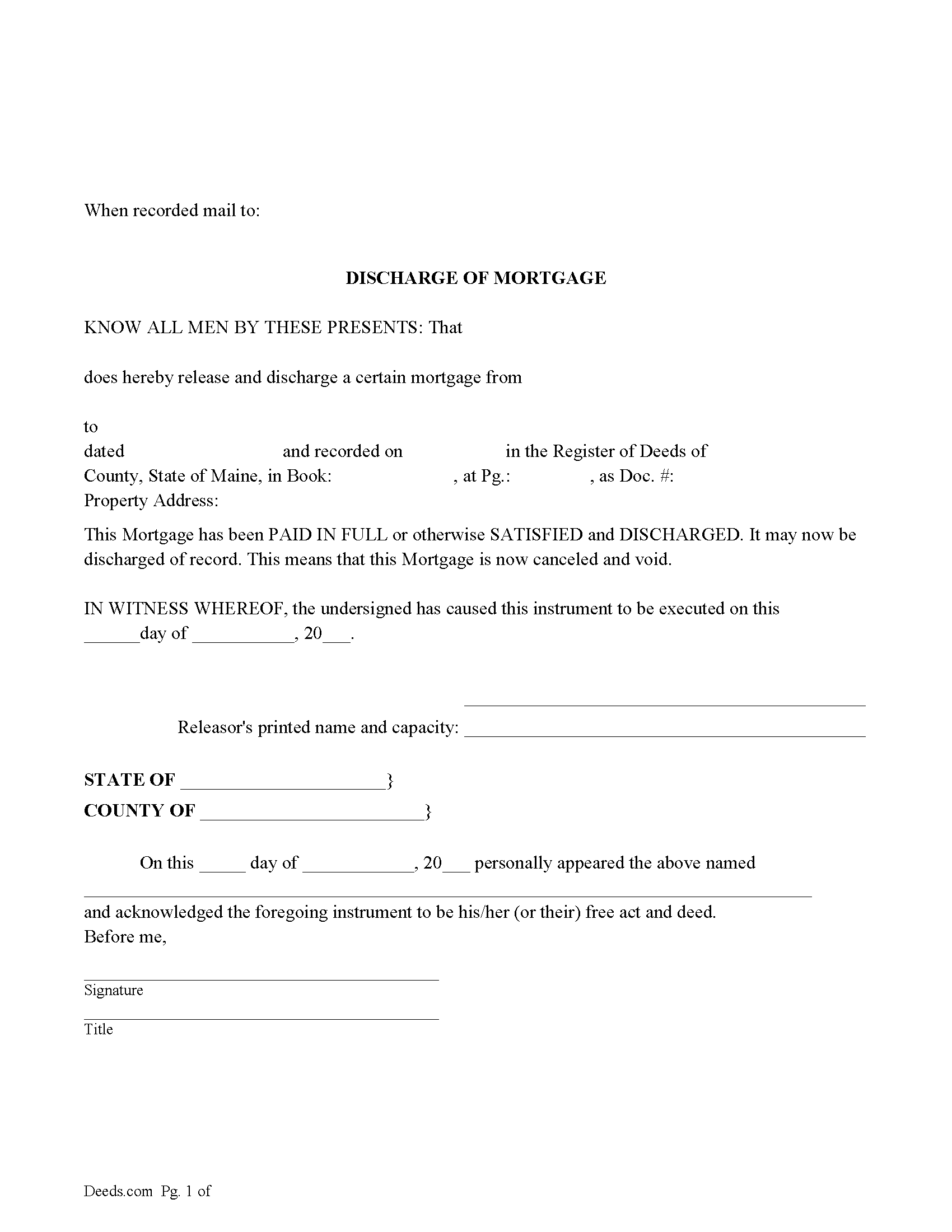
In general the mortgagee/lender has 60 day in which to record a discharge of mortgage once notified (If a release is not transmitted to the registry of deeds within 60 days, the owner and any such servicer are jointly and severally liable to an aggrieved party for damages equal to exemplary damages of $200 per week after expiration of the 60 days, up to an aggregate maximum of $5,000) This form is used (by the mortgagee or by the mortgagee's duly authorized officer or agent, personal representative or assignee.) (All discharges of recorded mortgages, attachments or liens of any nature must be recorded by a written instrument.) (551. Entry on record; neglect to discharge)
(Maine Discharge Package includes form, guidelines, and completed example) For use in Maine only.
... More Information about the Maine Discharge of Mortgage
General Durable Power of Attorney
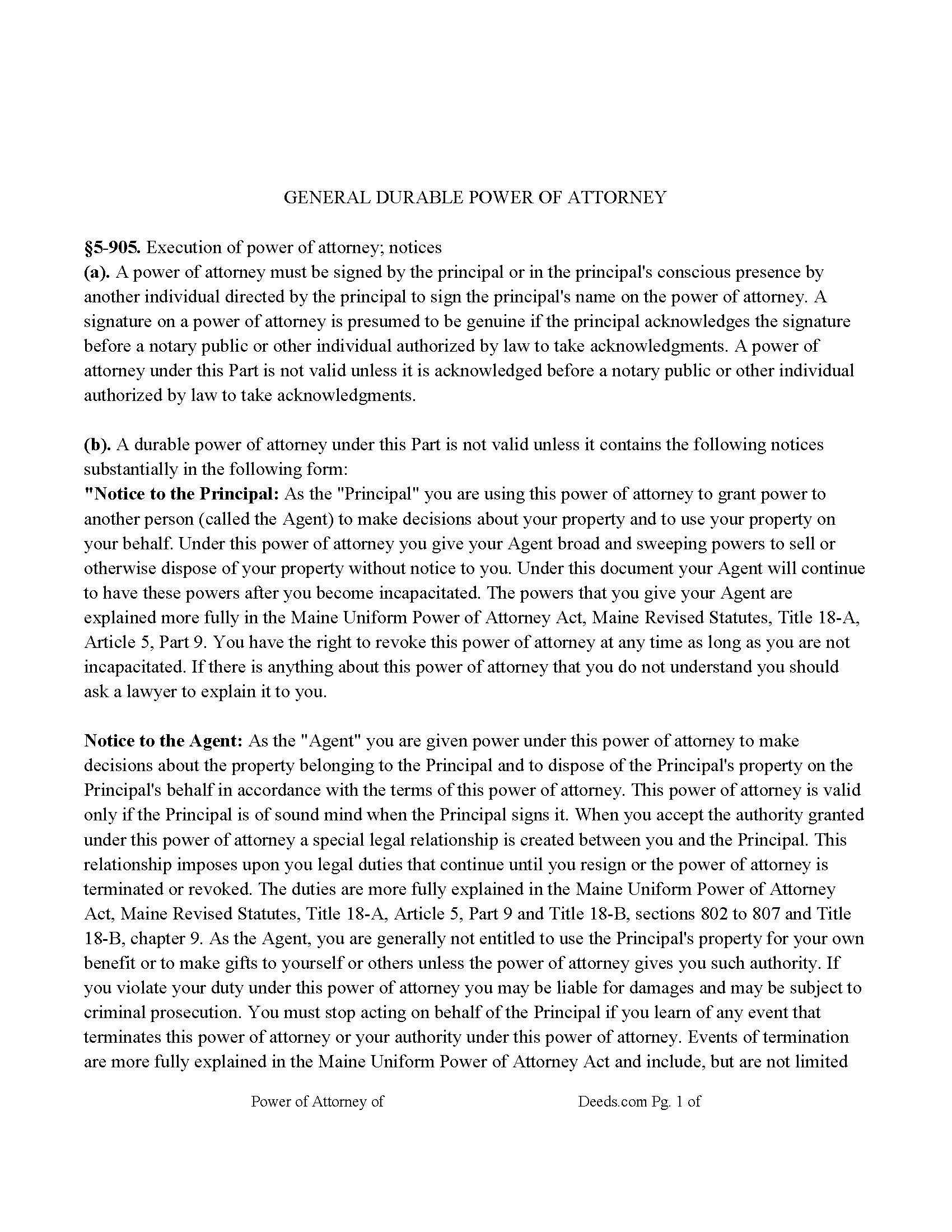
This form is formatted under the Maine Uniform Power of Attorney Act.
A durable power of attorney is NOT valid unless it contains these notices
1. Notice to the Principal
2. Notice to the Agent
General Authority can be granted to any or all as defined by Maine POA Statutes.
1. Real Property as defined in Section 5-934
2. Tangible Personal Property as defined in Section 5-935
Stocks and Bonds as defined in Section 5-936
4. Commodities and Options as defined in Section 5-937
5. Banks and Other Financial Institutions as defined in Section 5-938
6. Operation of Entity or Business as defined in Section 5-939
7. Insurance and Annuities as defined in Section 5-940
8. Estates, Trusts, and Other Beneficial Interests as defined in Section 5-941
Specific Authority is optional, can be granted to any or all as defined by 5-931.
(1). Create, amend, revoke or terminate an inter vivos trust;
(2). Make a gift;
(3). Create or change rights of survivorship;
(4). Create or change a beneficiary designation;
(5). Delegate authority granted under the power of attorney;
(6). Waive the principal's right to be a beneficiary of a joint and survivor annuity, including a ... More Information about the Maine General Durable Power of Attorney
Durable Limited Real Estate Power of Attorney (Sale)
.png)
This is a specific Power of Attorney form that allows an Agent of your choice the right to sell property on your behalf as defined by Maine Power of Attorney Statutes.
1. All Real Property powers as set forth in 5-934
2. All Tangible Personal Property powers as set forth in 5-935
3. All Banks and Other Financial Institutions powers as defined in5-938
4. All Taxes powers as defined in 5-946
INTERPRETATION: The meaning and effect of this Power of Attorney shall be determined by the laws of the State of Maine.
(Maine Limited POA-Sale Package includes form, guidelines, and completed example)
... More Information about the Maine Durable Limited Real Estate Power of Attorney (Sale)
Durable Limited Real Estate Power of Attorney (Purchase)
.png)
This is a specific Power of Attorney form that allows an Agent of your choice the right to PURCHASE real property on your behalf as defined by Maine Uniform Power of Attorney Statutes.
1. All Real Property powers as set forth in 5-934
2. All Tangible Personal Property powers as set forth in 5-935
3. All Banks and Other Financial Institutions powers as defined in 5-938
4. All Taxes powers as defined in 5-946
INTERPRETATION: The meaning and effect of this Power of Attorney shall be determined by the laws of the State of Maine.
(Maine LPOA-Purchase Package includes form, guidelines, and completed example)... More Information about the Maine Durable Limited Real Estate Power of Attorney (Purchase)
Notice of Furnishing
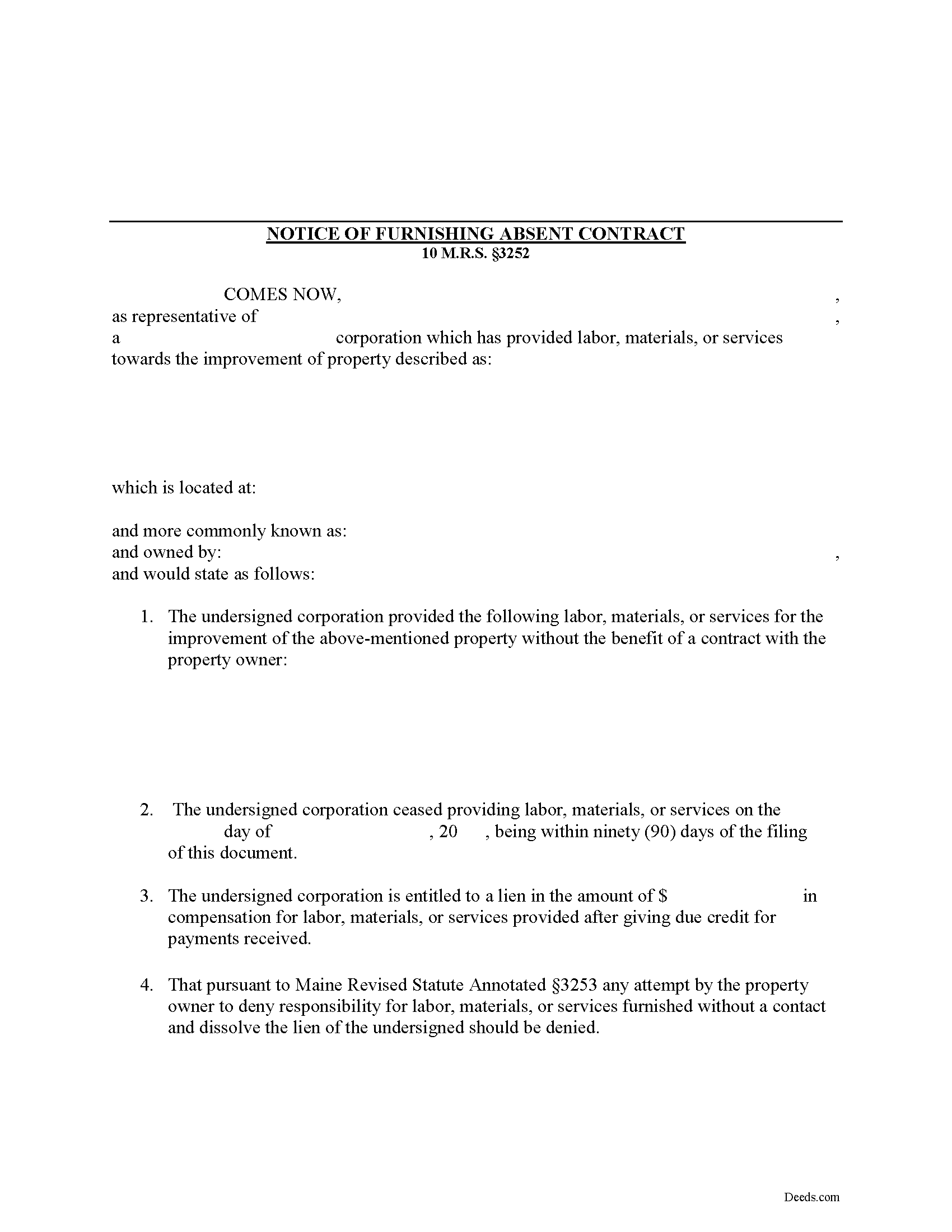
Mechanic's liens are governed under Title 10, Chapter 603 of the Maine Code. In Maine, persons providing labor or furnishing materials or equipment without a contract with the owner should serve the owner with a Notice of Furnishing to protect their lien rights.
If labor, materials or services were not furnished by a contract with the owner of the property affected, the owner may prevent a lien by giving written notice to the person performing or furnishing the same that he will not be obligated to pay for that work. 10 M.R.S. section 3252. The person furnishing labor or materials can act first by serving the Notice of Furnishing before the owner provides a notice of non-responsibility. By doing this, he or she preserves lien rights.
A notice of furnishing identifies the parties, relevant dates and payments, the location and a description of the materials and/or services. Submit the completed, signed, and notarized document to the local office responsible for maintaining land records, and give the property owner a certified copy of the recorded document.
This article is provided for informational purposes only and should not be relied upon as substitute for the advice fr... More Information about the Maine Notice of Furnishing
Notice to Owner
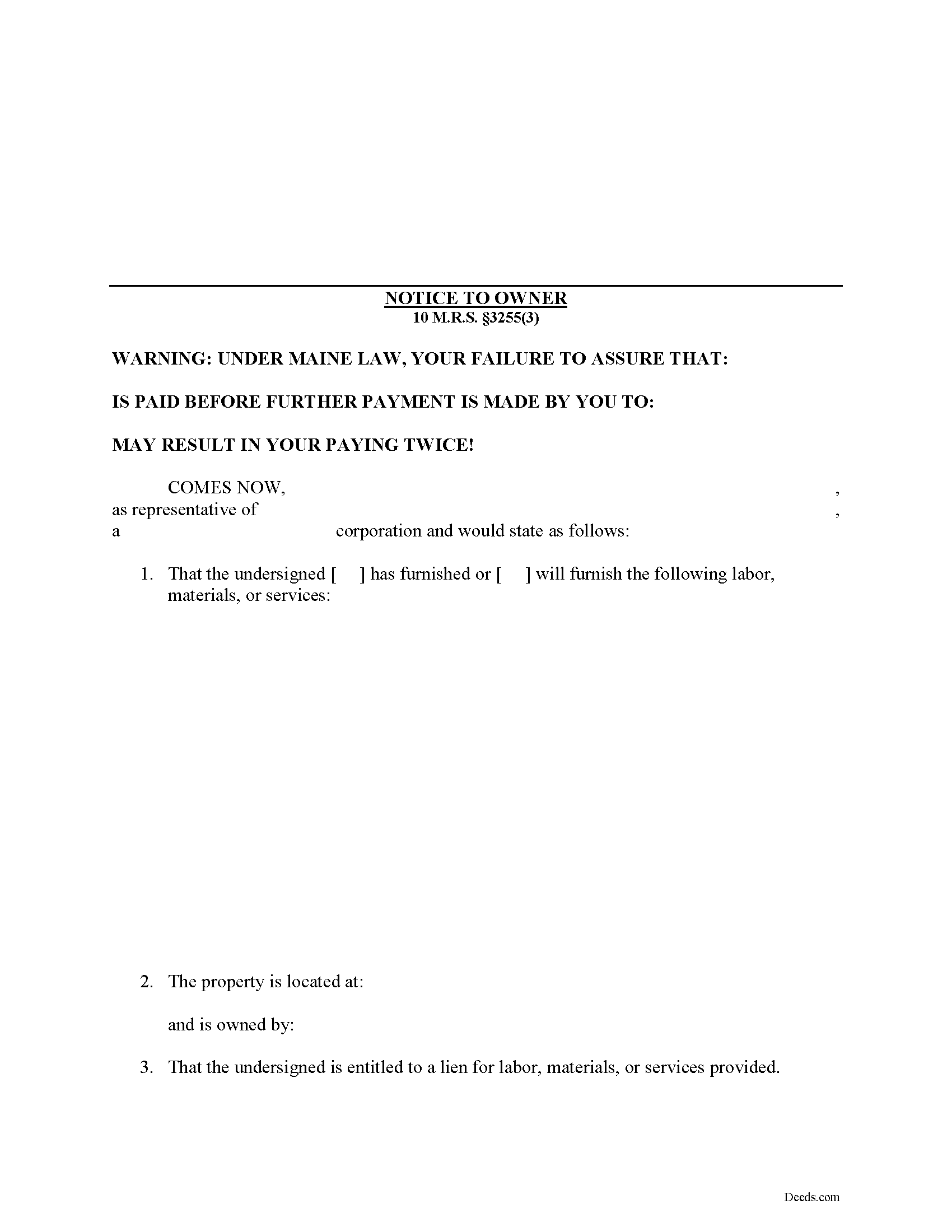
Mechanic's liens are governed under Title 10, Chapter 603 of the Maine Code. In Maine, persons furnishing labor, equipment, materials or services without a direct contract with the owner should to send a Notice to Owner document to preserve lien rights. The notice to owner informs the owner of a subordinate contractor's potential lien claim, and reminds them to ensure that, before paying any other party, they should confirm the claimant sending the notice is paid or the owner could end up paying twice for the same labor and materials. Basically, this document protects the property owner and the subcontractor sending the notice, from any unscrupulous actions by the prime contractor.
If the labor, materials or services were not performed or furnished by a contract with the owner of the property affected, a lien may only be enforced against the property affected to the extent of the balance due to the person with whom the owner has directly contracted to perform or furnish the labor, materials and services on which that lien claim is based. 10 M.R.S. section 3255(3). The defense shall only be available with respect to sums paid by the owner to the prime contractor, where payment wa... More Information about the Maine Notice to Owner
Notice of Mechanic Lien
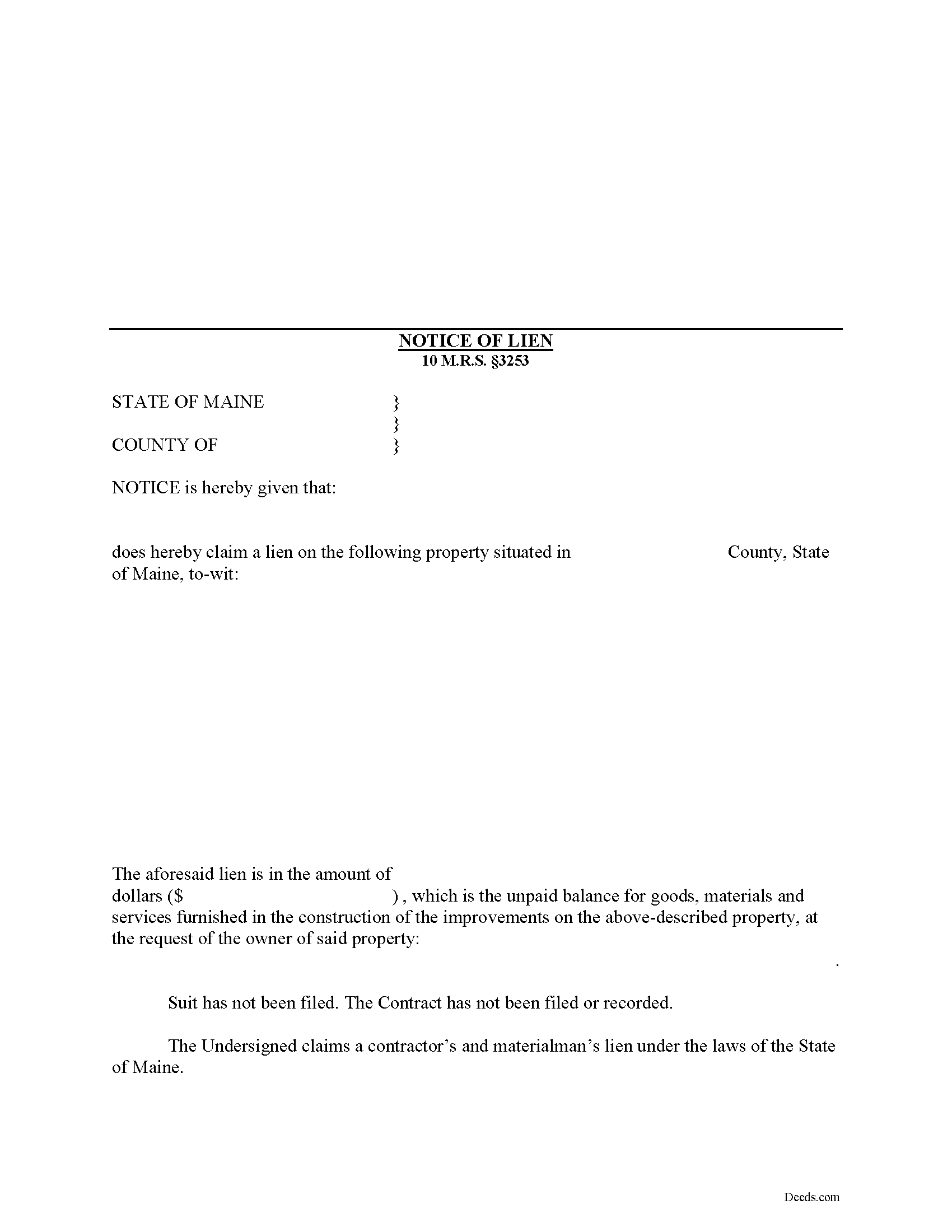
Mechanic's Liens place a block or burden on a property owner's title when a claimant (such as a contractor, materials supplier, or other laborer such as a subcontractor) has not been paid for labor, materials, or equipment provided. In Maine, mechanic's liens are governed under Chapter 10 of the Maine legislative code.
Certain steps must be performed to claim a valid lien. A mechanic's lien must be filed within ninety (90) days after ceasing to perform labor, furnish materials or perform services. 10 M.R.S. section 3253(A). To claim a lien in Maine, the claimant must file a true statement of the amount due the claimant, with all just credits given, together with a description of the property intended to be covered by the lien sufficiently accurate to identify it and the names of the owners, the office of the register of deeds in the county or registry district in which the building, wharf or pier is situated. Id.
The statement must be subscribed and sworn to by the person claiming the lien, or by someone in the claimant's behalf, and recorded in a book kept for that purpose by the register of deeds for the county or registry district, who is entitled to the same fees as for r... More Information about the Maine Notice of Mechanic Lien
Release of Mechanic Lien
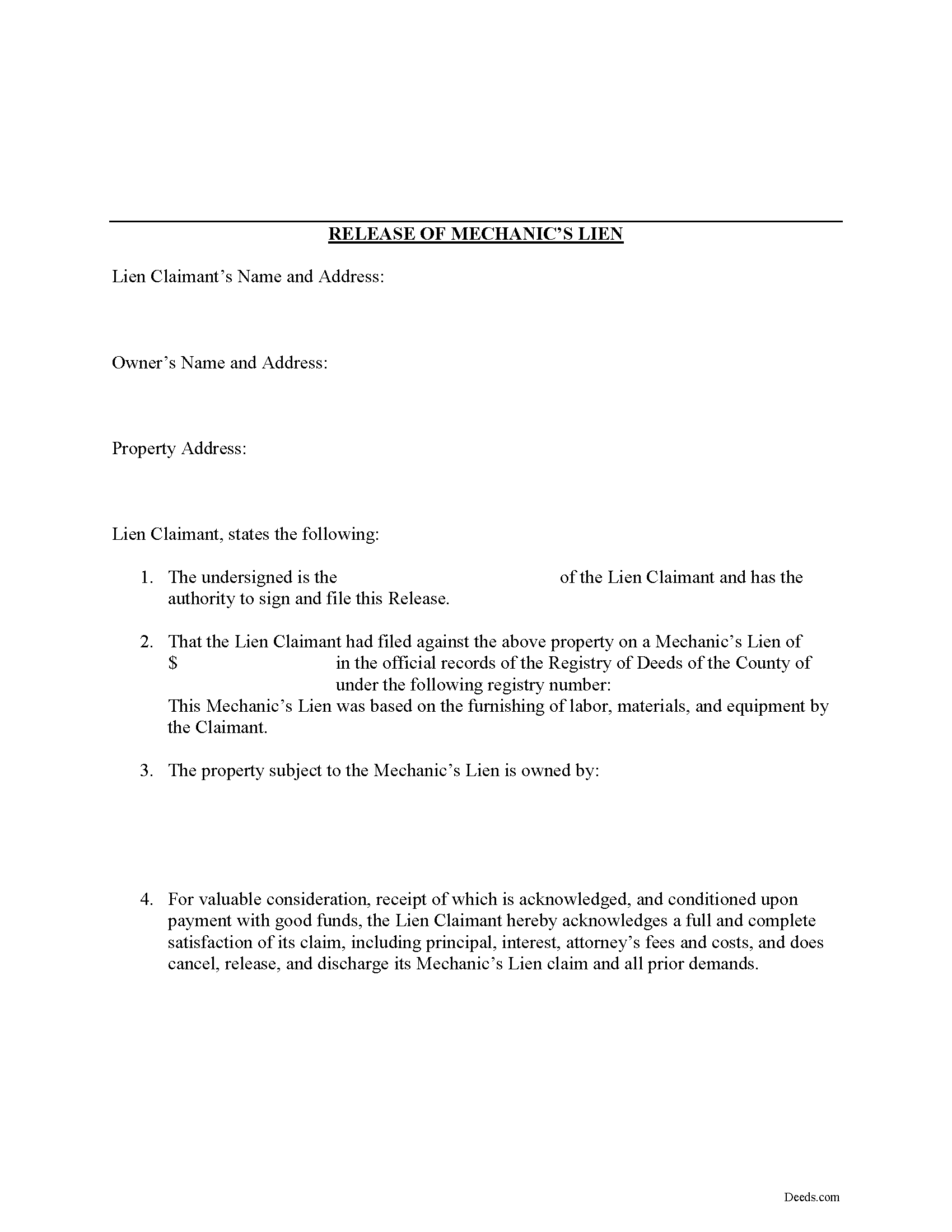
Mechanic's liens are governed under Title 10, Chapter 603 of the Maine Code. In Maine, liens that have been paid off or satisfied for any other reason should be properly discharged by filing a lien release in the country registry of deeds in the county where the lien was originally recorded. Maine does not require any specific statutory form for releasing a lien, although under common law principles of contract, the claimant is entitled to do so.
A release of lien form identifies the parties, the project's location, relevant dates and payments, and filing information about the recorded lien. Submit the signed, notarized release to the same county office where the underlying lien was filed.
This article is provided for informational purposes only and should not be relied upon as substitute for the advice from an attorney. For any questions regarding filing a lien release, or any other issues related to liens in Maine, please speak with a licensed attorney.... More Information about the Maine Release of Mechanic Lien
Conditional Lien Waiver on Progress Payment
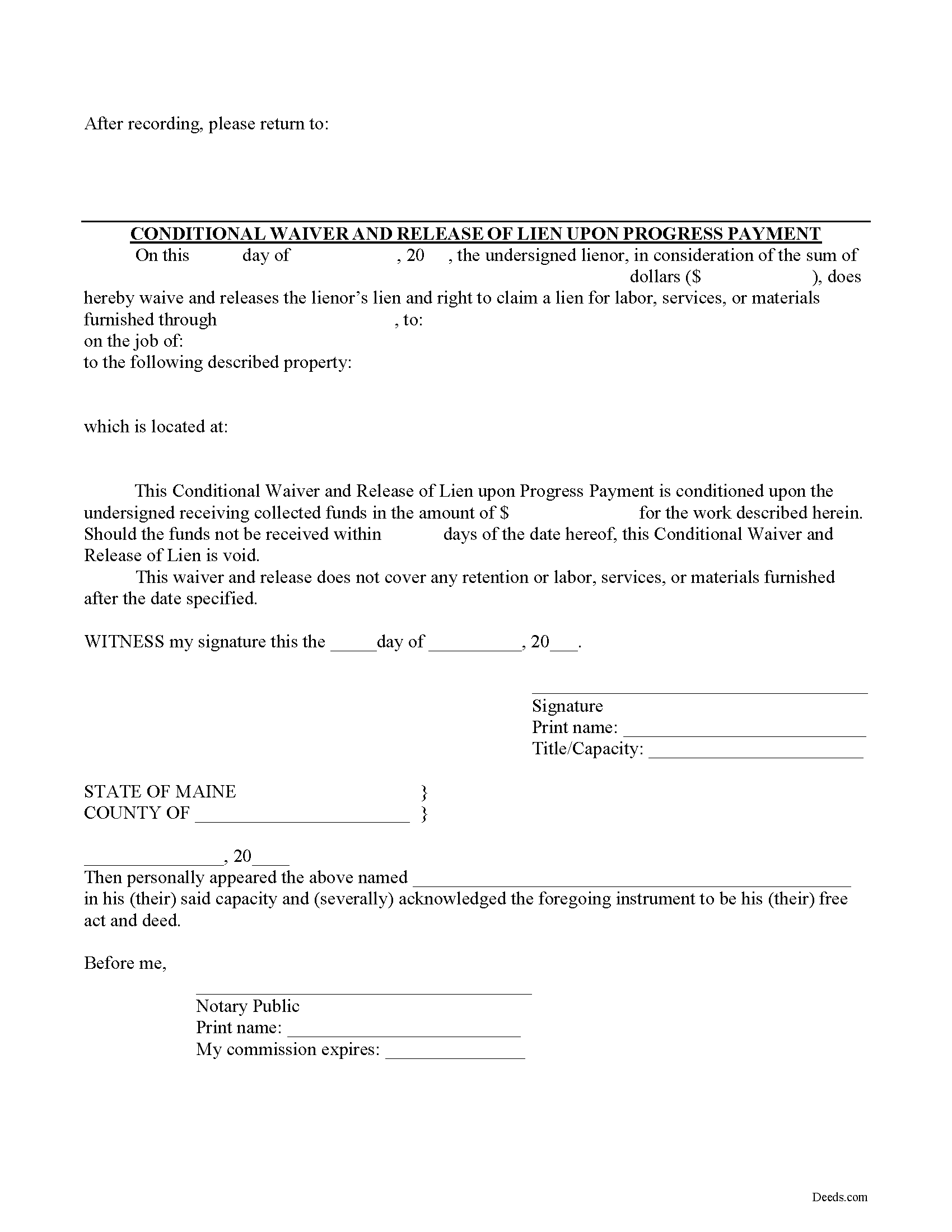
Mechanic's liens are governed under Title 10, Chapter 603 of the Maine Code. A waiver is a forfeiture or "giving up" of a legal right. In this case, the person granting the waiver is giving up the right to seek a mechanic's lien for all or part of the amount due. This assurance is usually enough to get the other party to pay. The Maine Code does not set out statutory forms for waivers, but according to the principles of contract law, the parties may agree to such modifications in writing.
In general, there are four types of waivers: conditional or unconditional, and referring to a partial or final payment. Conditional waivers become effective when the payment is confirmed (paid) by the bank, and offer more protection for the contractor. Unconditional waivers go into effect immediately, regardless of whether or not the payment is confirmed, and give more protection for the property owner. Partial, or progress payments relate to specific time frames or completed steps in the project. Final payment waivers apply when the responsible party pays the entire balance due.
In a situation where a property owner pays for work completed to date on a continuing project, the owner might ... More Information about the Maine Conditional Lien Waiver on Progress Payment
Unconditional Lien Waiver on Progress Payment
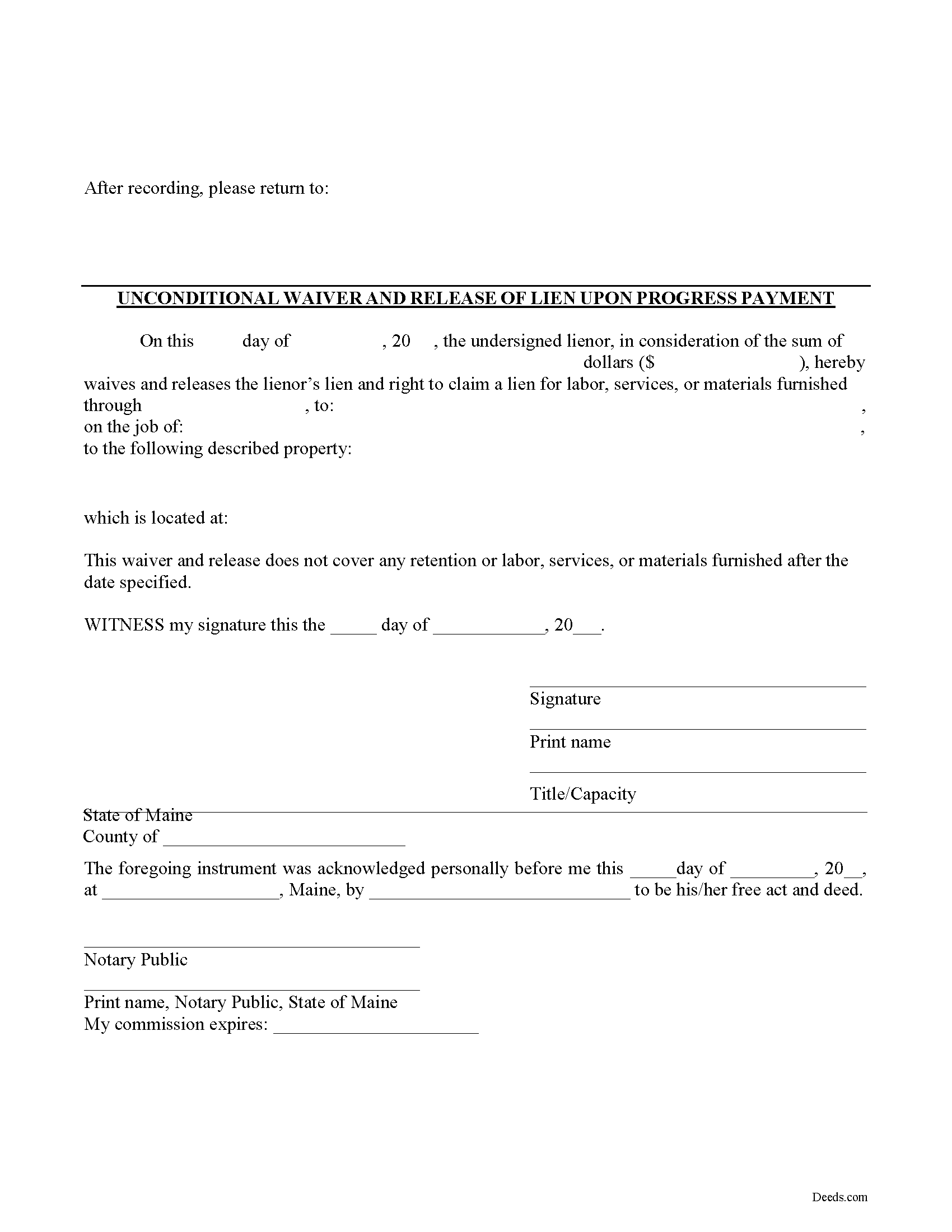
Mechanic's liens are governed under Title 10, Chapter 603 of the Maine Code. A waiver is a forfeiture or "giving up" of a legal right. In this case, the person granting the waiver is giving up the right to seek a mechanic's lien for all or part of the amount due. This assurance is usually enough to get the other party to pay. The Maine Code does not set out statutory forms for waivers, but according to the principles of contract law, the parties may agree to such modifications in writing.
In general, there are four types of waivers: conditional or unconditional, and referring to a partial or final payment. Conditional waivers become effective when the payment is confirmed (paid) by the bank, and offer more protection for the contractor. Unconditional waivers go into effect immediately, regardless of whether or not the payment is confirmed, and offer more protection for the property owner. Partial, or progress payments relate to specific time frames or completed steps in the project. Final payment waivers apply when the responsible party pays the entire balance due.
An unconditional waiver is effective when signed and given to the property owner and waives part of the lien am... More Information about the Maine Unconditional Lien Waiver on Progress Payment
Conditional Lien Waiver on Final Payment
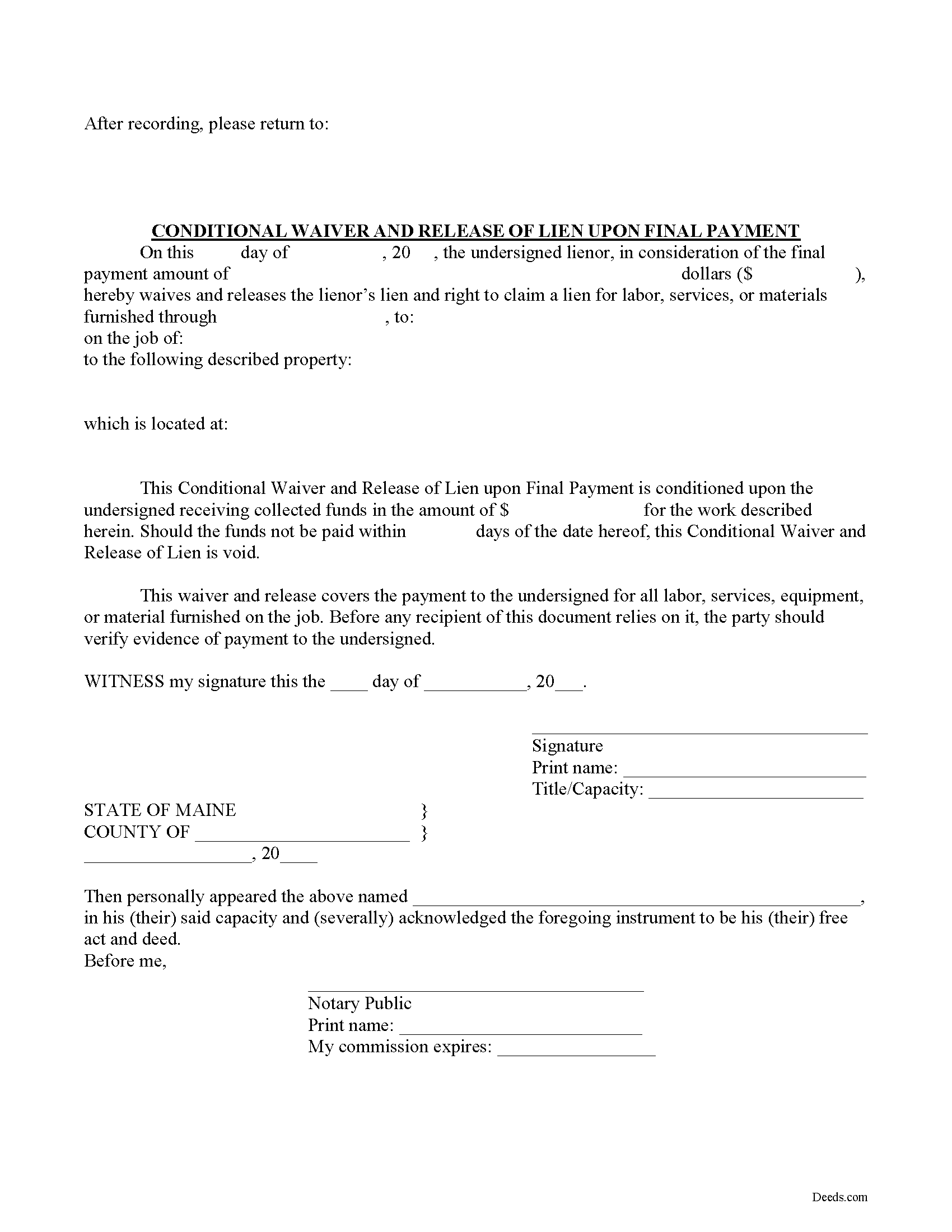
Mechanic's liens are governed under Title 10, Chapter 603 of the Maine Code. A waiver is a forfeiture or "giving up" of a legal right. In this case, the person granting the waiver is giving up the right to seek a mechanic's lien for all or part of the amount due. This assurance is usually enough to get the other party to pay. The Maine Code does not set out statutory forms for waivers, but according to the principles of contract law, the parties may agree to such modifications in writing.
In general, there are four types of waivers: conditional or unconditional, and referring to a partial or final payment. Conditional waivers become effective when the payment is confirmed (paid) by the bank, and offer more protection for the contractor. Unconditional waivers go into effect immediately, regardless of whether or not the payment is confirmed, and offer more protection for the property owner. Partial, or progress payments relate to specific time frames or completed steps in the project. Final payment waivers apply when the responsible party pays the entire balance due.
A final conditional waiver should be used when the full and final payment is made, but doubts remain about the p... More Information about the Maine Conditional Lien Waiver on Final Payment
Unconditional Lien Waiver on Final Payment
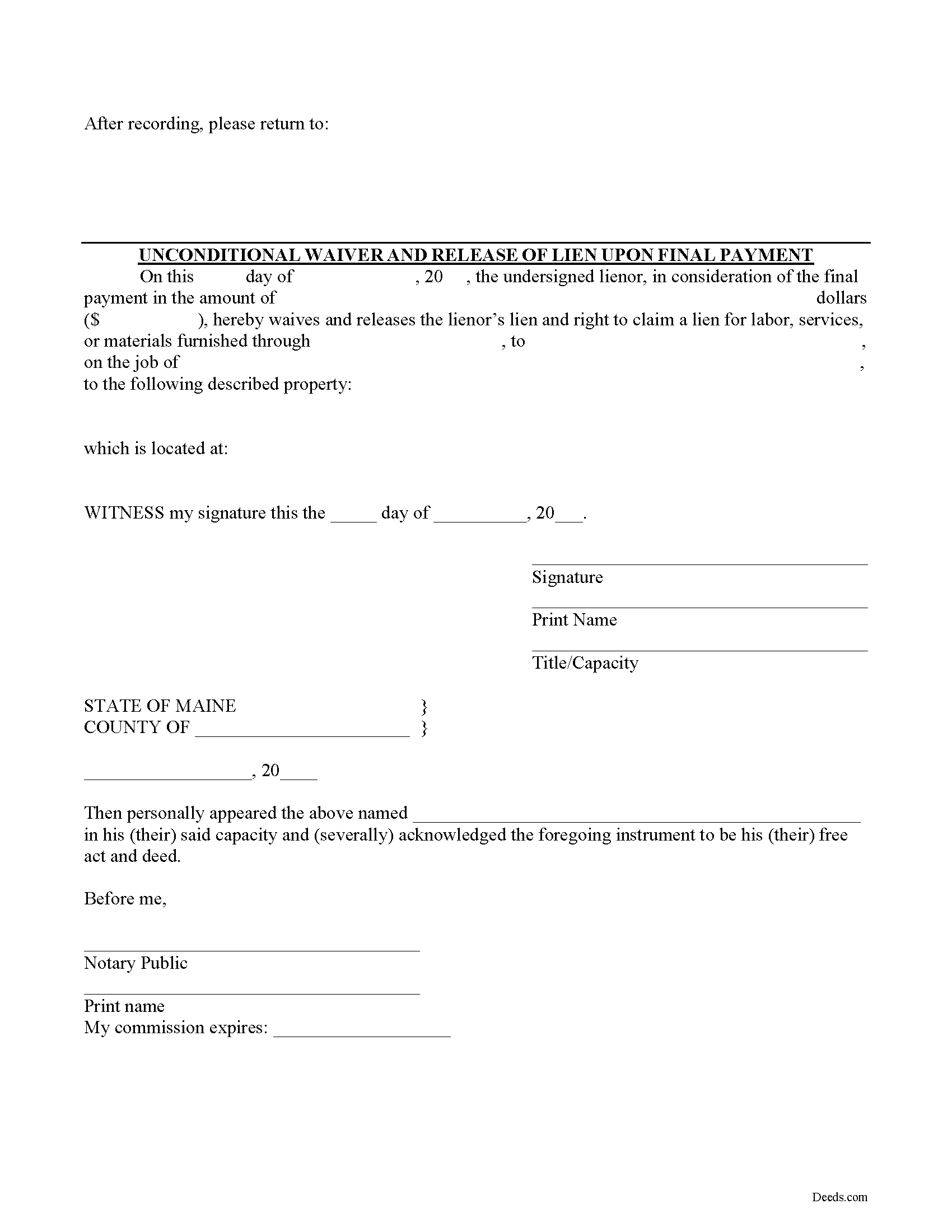
Mechanic's liens are governed under Title 10, Chapter 603 of the Maine Code. A waiver is a forfeiture or "giving up" of a legal right. In this case, the person granting the waiver is giving up the right to seek a mechanic's lien for all or part of the amount due. This assurance is usually enough to get the other party to pay. The Maine Code does not set out statutory forms for waivers, but according to the principles of contract law, the parties may agree to such modifications in writing.
In general, there are four types of waivers: conditional or unconditional, and referring to a partial or final payment. Conditional waivers become effective when the payment is confirmed (paid) by the bank, and offer more protection for the contractor. Unconditional waivers go into effect immediately, regardless of whether or not the payment is confirmed, and offer more protection for the property owner. Partial, or progress payments relate to specific time frames or completed steps in the project. Final payment waivers apply when the responsible party pays the entire balance due.
Use the final unconditional waiver when a full and final payment is made and collectability of the due amount i... More Information about the Maine Unconditional Lien Waiver on Final Payment
Transfer of Death Deed
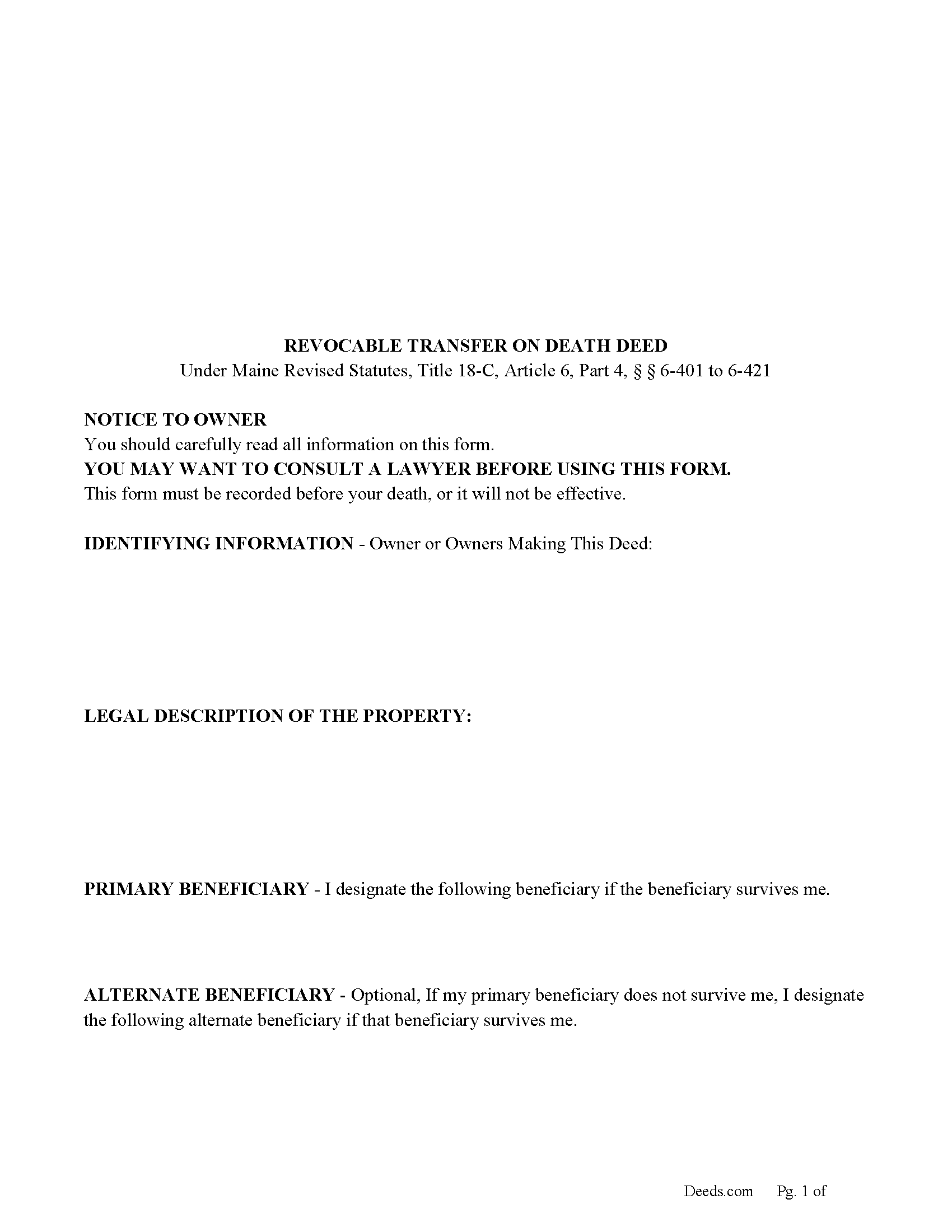
REVOCABLE TRANSFER ON DEATH DEED
Under Maine Revised Statutes, Title 18-C, Article 6, Part 4, 6-401 to 6-421
Effective September 1, 2019 owners of real estate in Maine can take advantage of a useful estate planning tool: the transfer on death deed (TODD).
The Owner(s)/Transferor(s) [may transfer for no consideration property to one or more beneficiaries effective at the transferor's death by a transfer on death deed.] [6-405]
This Transfer on Death Deed may be revoked by the Transferor's prior to their death, Capacity requirements are (the same as the capacity required to make a will.) (6-408)
To become effective the Transfer on Death Deed must be recorded prior to (the transferor's death in the public records in the registry of deeds in the county where the property is located.) (Must state that the transfer to the designated beneficiary is to occur at the transferor's death.) (6-409)
(Maine TOD Package includes form, guidelines, and completed example)
... More Information about the Maine Transfer of Death Deed
Transfer on Death Deed Revocation
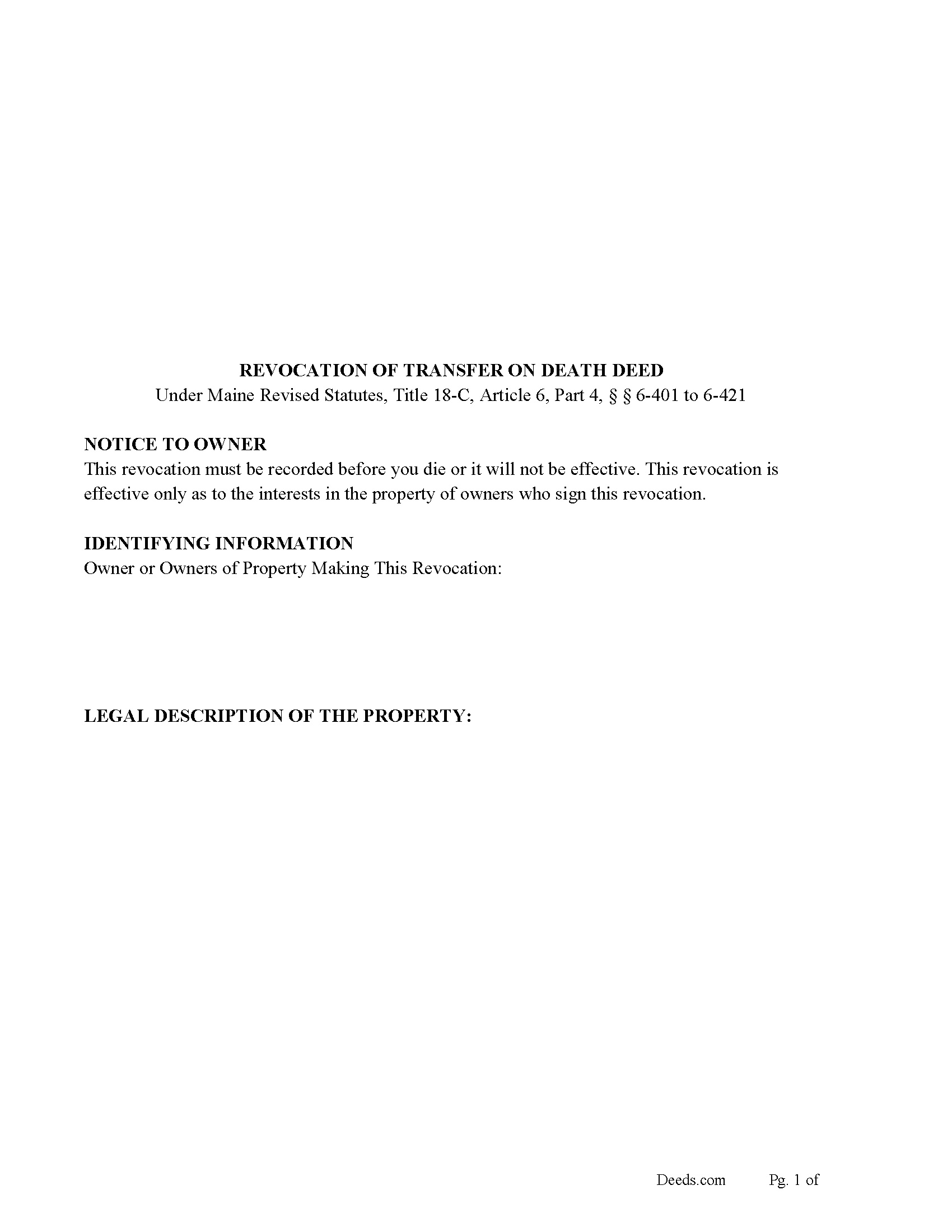
Use this form to revoke a previously recorded Transfer on Death Deed.
Transfer on death deeds allow individual landowners to transfer their real estate when they die, but outside of a will and without the need for probate. The transferor simply executes a TODD form, then records it during the course of his/her natural life. Unlike grant deeds or quitclaim deeds, however, there is no change in ownership when a transfer on death deed is recorded . In Maine (a Transfer on Death Deed is revocable even if the deed or another instrument contains a contrary provision.) (6-406)
There are basically 3 ways to revoke a Transfer on Death Deed in the State of Maine
6-411. Revocation by instrument authorized; revocation by act not permitted
1. Revocation by instrument. Subject to subsection 2, an instrument is effective to revoke a recorded transfer on death deed, or any part of it, only if the instrument:
A. Is one of the following:
(1) A transfer on death deed that revokes the deed or part of the deed expressly or by inconsistency;
(2) An instrument of revocation that expressly revokes the deed or part of the deed; or
(3) An inter vivos deed that expressly revokes the tra... More Information about the Maine Transfer on Death Deed Revocation
Notice of Death Affidavit
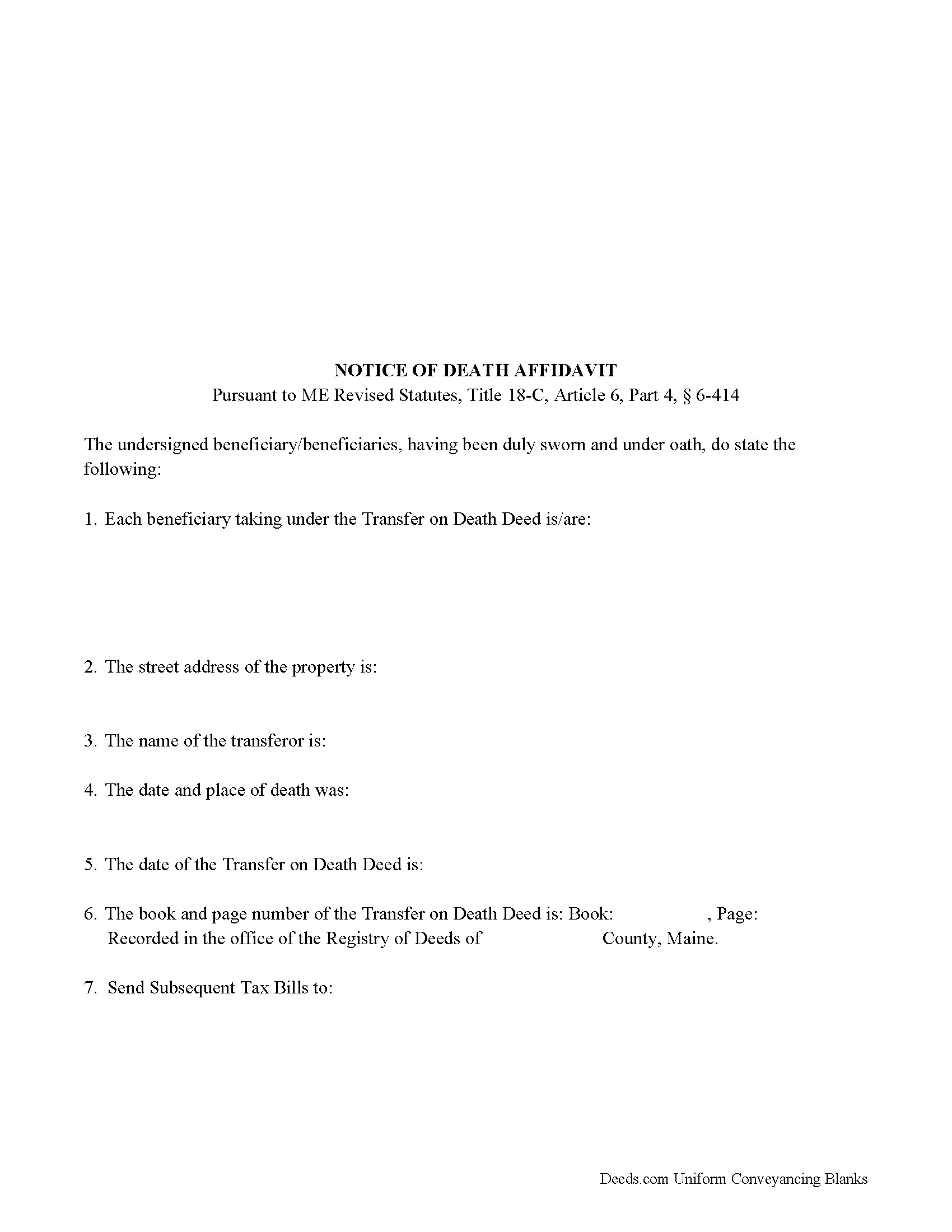
In Maine a Notice of Death Affidavit is appropriate for use by a surviving beneficiary identified in a recorded Transfer on Death Deed. The beneficiaries record the Notice of Death Affidavit (in the registry of deeds in the county where the real property is located) (to confirm title following the death of the transferor.)
The Notice of Death Affidavit must contain:
1. (The name and address, if known, of each beneficiary taking under the transfer on death deed)
2. (The street address of the property)
3. (The date of the transfer on death deed)
4. (The book and page number at which the transfer on death deed was recorded prior to the transferor's death)
5. (The name of the deceased transferor)
6. (The date and place of death)
7. (The name and address to which all future tax bills should be mailed)
8. (The affidavit must be notarized.) (ME revised statute 6-414)
(Maine Notice of Death Affidavit Package includes form, guidelines, and completed example)... More Information about the Maine Notice of Death Affidavit
Disclaimer of Property Interest
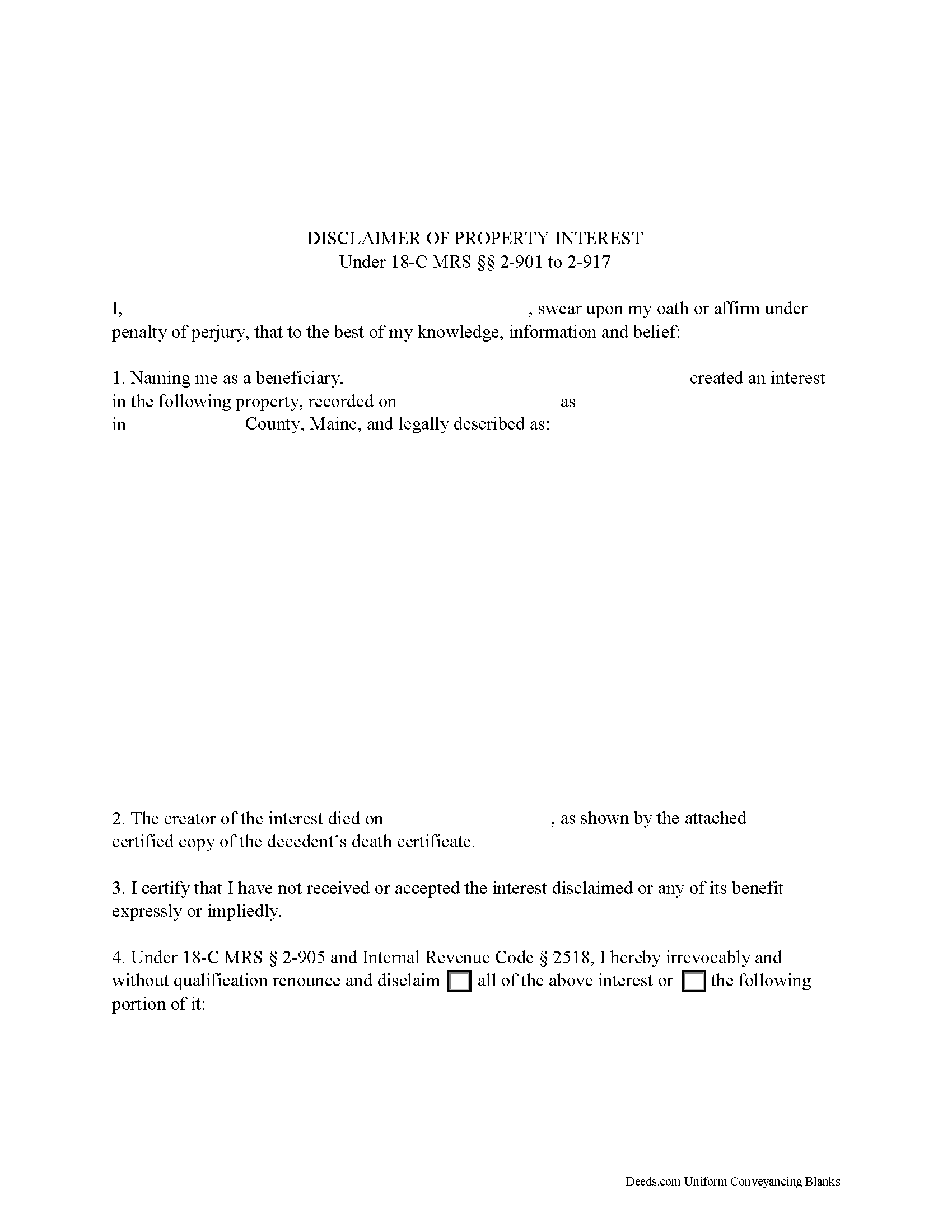
Under the Maine Statutes, the beneficiary of an interest in property may renounce the gift, either in part or in full (2-905). Note that the option to do so is only available to beneficiaries who have not acted in any way to indicate acceptance or ownership of the interest (2-913(A)).
The renunciation must be in writing and include a description of the interest, a declaration of intent to renounce all or a defined portion of the interest, and be signed by the renouncing party ( 2-905(3)).
A disclaimer becomes irrevocable when it is delivered or filed pursuant to section 2-912 or when it becomes effective as provided in sections 2-906 to 2-911, whichever occurs later.
2-908. Disclaimer of interest by trustee
If a trustee disclaims an interest in property that otherwise would have become trust property, the interest does not become trust property.
2-916. Application to existing relationships
Except as otherwise provided in section 2-913, an interest in or power over property existing on September 1, 2019 as to which the time for delivering or filing a disclaimer under law superseded by this Part has not expired may be disclaimed after September 1, 2019.
(Maine Dis... More Information about the Maine Disclaimer of Property Interest
Certificate of Trust
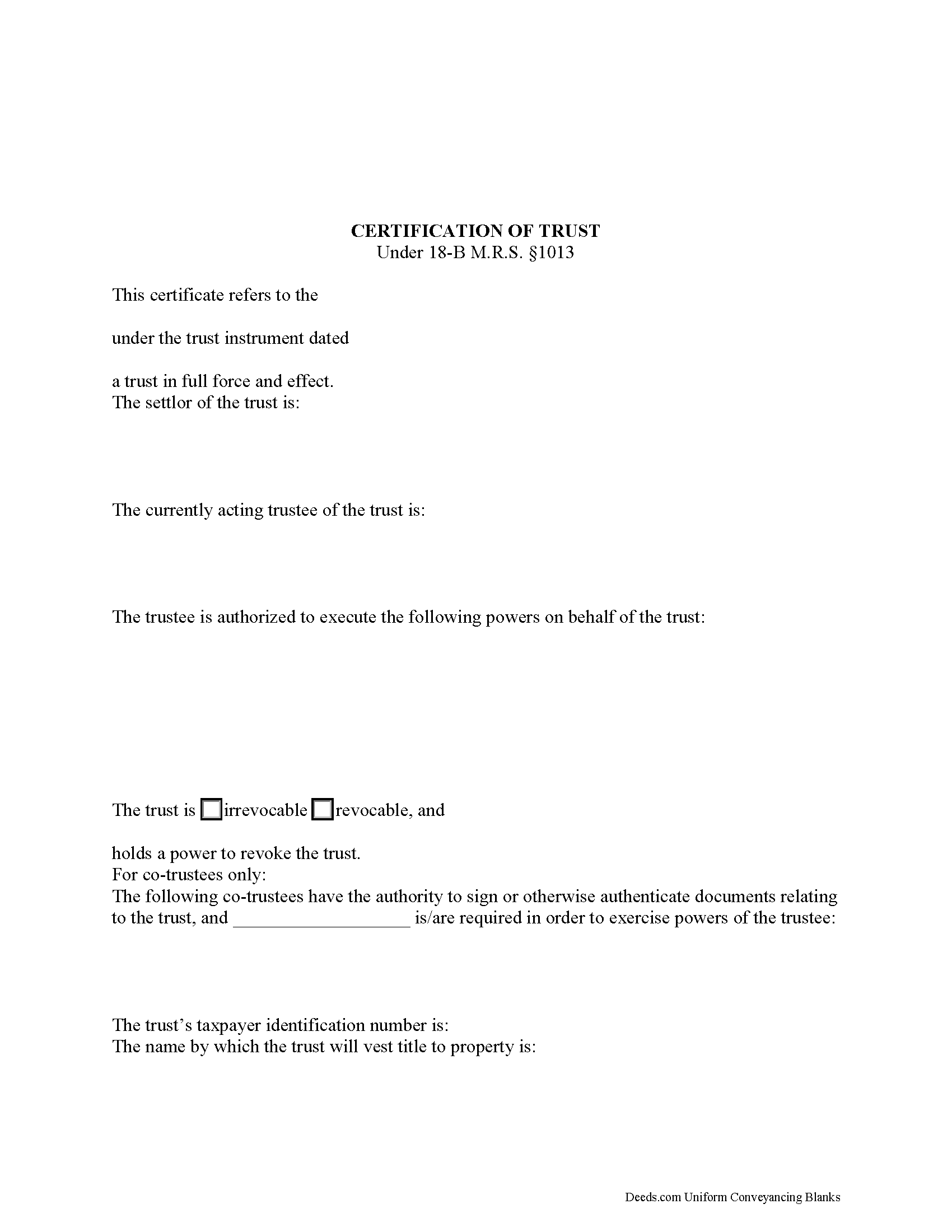
The Maine certification of trust falls under the Maine Uniform Trust Code and is codified at 18-B M.R.S. 1013.
Under the statute, "Instead of furnishing a copy of the trust instrument to a person other than a beneficiary, the trustee may furnish to the person a certification of trust" (18-B M.R.S. 1013(1)). A trustee doing business on behalf of a trust generally provides a certificate as proof of his/her/their authority to act.
As an abstract of the trust instrument, the certificate contains only essential information relevant to the transaction at hand, allowing the trust instrument to remain private. For trustees not wishing to disclose the identity of persons having a beneficial interest in the trust, the certificate is a useful alternative to providing the trust instrument.
The certificate requires specific information about the trust, including the name and date of the trust instrument, the trust's taxpayer identification number, and whether the trust is revocable or irrevocable. It includes the trust's settlor, who is "a person, including a testator, who creates or contributes property to a trust" in addition to each acting trustee's name and address (18-B M.R.S. 10... More Information about the Maine Certificate of Trust